
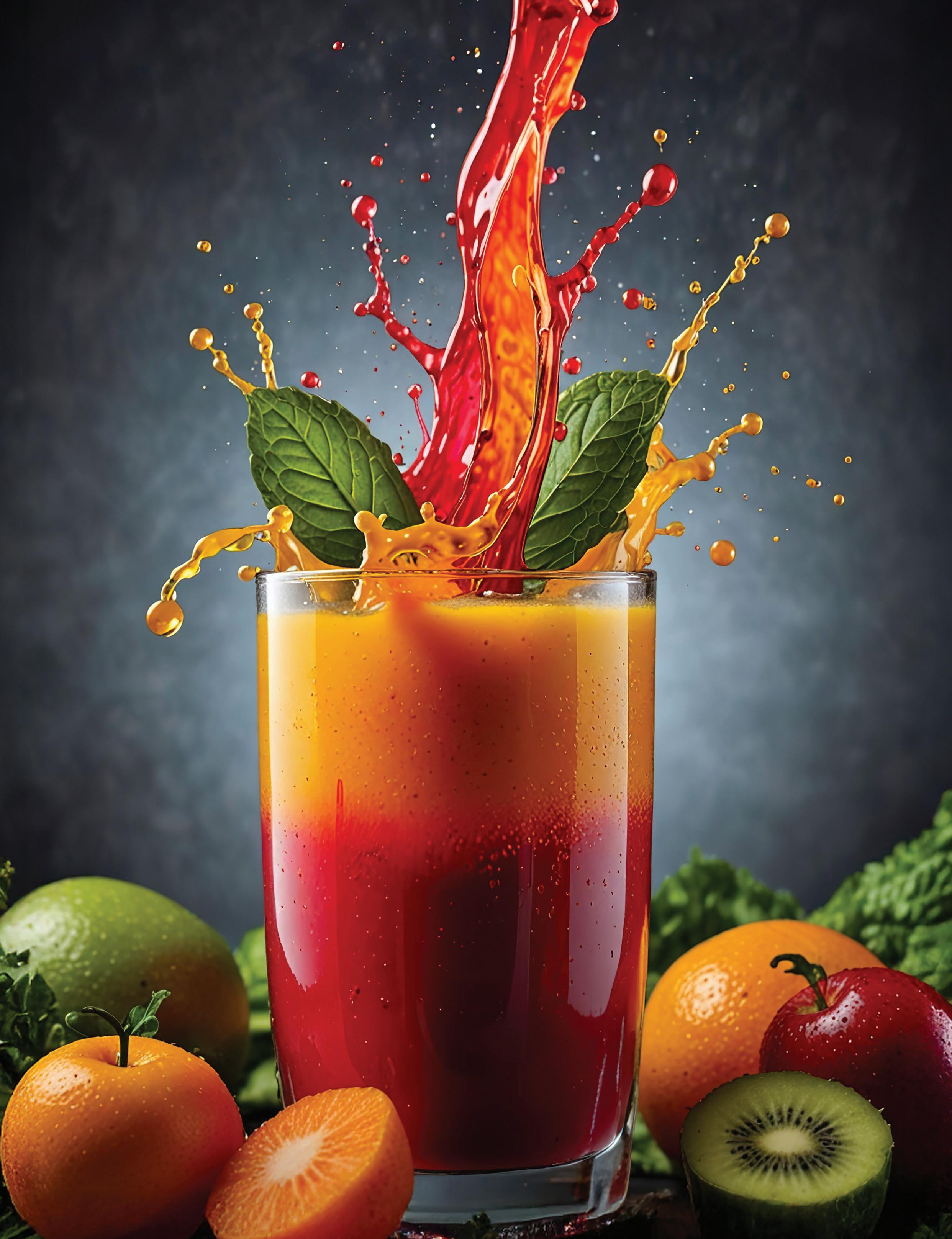
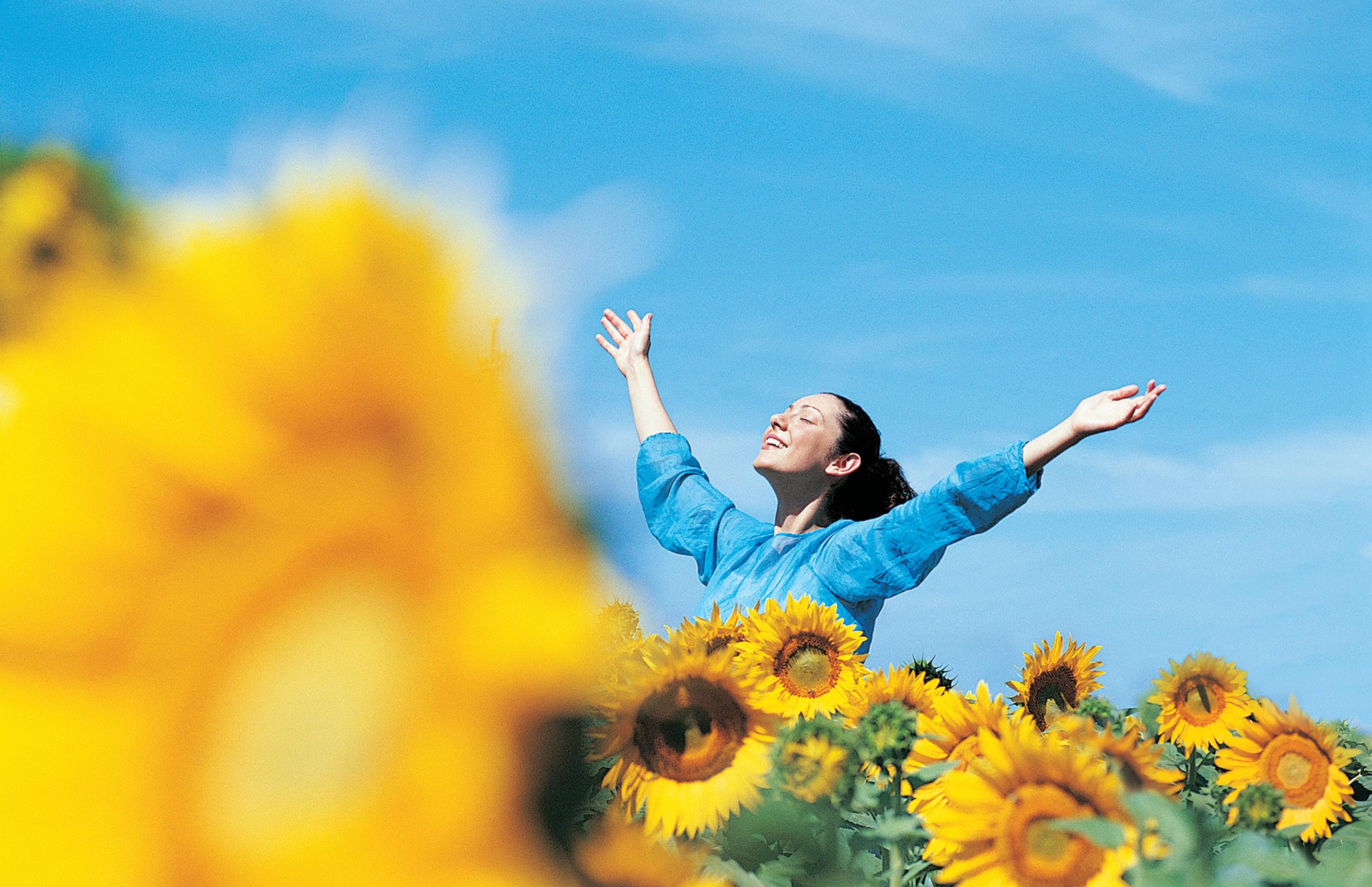




Own Your Own Natural Awakenings Magazine!
Make a meaningful impact in your community by becoming the owner of a Natural Awakenings magazine.
Empower others with current, valuable insights and resources to enhance their physical, mental, emotional and spiritual well-being.
As a franchise owner, you’ll inspire positive change, provide readers with tools for healthier living and connect local businesses with an audience eager for transformation.
Why Own a Natural Awakenings Magazine?
n Create a Healthier Community: Be the go-to resource for wellness and personal growth in your area.
n Boost Your Income: Take control of your financial future with a proven business model.
n Enjoy a Flexible Lifestyle: Work from home while pursuing a fulfilling, dynamic career.
n A proven business model with low startup costs.
n Comprehensive training and friendly, ongoing support.
n Flexible work schedule with many work-from-home opportunities.
n Access to a network of like-minded franchise owners.
n Financing Options Available.
Join a thriving network of passionate franchise owners reshaping the future of holistic health and wellness.
Call 239-206-2000 for a FREE evaluation of your community’s potential. Learn more or apply today at: Corp.NaturalAwakenings.com

Call for a free evaluation of your community's potential at 239-206-2000. To apply or learn more, visit Corp.NaturalAwakenings.com.
Add Your Community to Where Natural Awakenings Is Now Publishing:
• Atlanta, GA
• Boston, MA
• Broward County, FL
• Bucks/Montgomery Counties, PA
• Central Florida/Greater Orlando, FL
• Central New Jersey
• Charlotte, NC
• Chicago, IL
• Columbia, SC
• Dallas, TX
• Daytona/Volusia/Flagler Counties, FL
• Detroit/Wayne County, MI
• Fairfield & Southern Litchfield Counties, CT
• Grand Traverse Region/Northern Michigan
• Greater Ann Arbor, MI
• Greater Lansing, MI
• Greater Oakland, Macomb, Livingston, Genesee, MI
• Gulf Coast, Alabama/Mississippi
• Houston, TX
• Jacksonville/St. Augustine, FL
• Lancaster/Berks, PA
• Lehigh Valley, PA
• Long Island, NY
• Milwaukee, WI
• Monmouth/Ocean Counties, NJ
• Naples/Fort Myers, FL
• New York City, NY
• North Central New Jersey
• North New Jersey
• Northwest Florida
• Palm Beach, FL
• Philadelphia, PA
• Phoenix, AZ
• Rhode Island
• Richmond, VA
• Sarasota, Manatee, Charlotte and DeSoto Counties, FL
• South Central Pennsylvania
• South Jersey, NJ
• Southeast North Carolina
• Space & Treasure Coast, FL
• Tampa, FL
• Tucson, AZ
• Twin Cities, MN
• Westchester/Putnam/Dutchess, NY
• Western Michigan


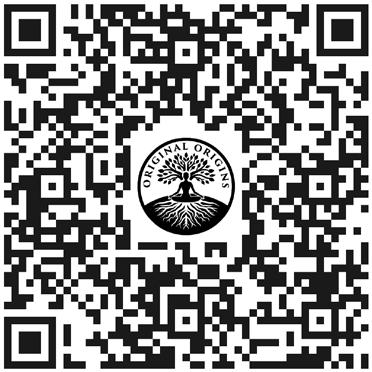
Publisher Tracy Jacox-Gunter
Editor Sara Gurgen
Design, Production & Digital Marketing Kristina Parella
Contributing Writer Michaela Leung Tiana Tarver
Distribution Manager Larry Gunter Ad Design Lauren Arabis
Website Matthew Davis
MsTracy@MidlandsNA.com
Tracy Jacox-Gunter Ph: 839-228-1158
Website
ColumbiaNaturalAwakenings.com

Save a Tree Scan Me
CEO Kimberly B. Whittle
National Editor Sandra Yeyati
Editor Brooke Goode
Copy Editor/Proofing Melanie Rankin
Layout Flip180 Media
Natural Awakenings
Publishing Corporation
350 Main Street, Suite 9B
Bedminster, NJ 07921
Ph: 239-206-2000
NaturalAwakenings@KnoWEwell.com
Cover image by AdobeStock_1120004280

Natural Awakenings is printed on partially recycled and fully recyclable newsprint with black soy ink.
© 2025 by Natural Awakenings. All rights reserved. Although some parts of this publication may be reproduced and reprinted, we require that prior permission be obtained in writing.
Natural Awakenings is a free publication distributed locally and is supported by our advertisers. Please call to find a location near you or if you would like copies placed at your business. We do not necessarily endorse the views expressed in the articles and advertisements, nor are we responsible for the products and services advertised. Check with a healthcare professional regarding the appropriate use of any treatment.

Dear Natural Awakenings family,
Time has a way of moving swiftly, doesn’t it? It feels like just yesterday I stepped into the role of publisher for Natural Awakenings Columbia. Yet here we are—one year later— celebrating a full circle of seasons, stories and community connections. This milestone has me reflecting on what I’ve learned—not only about publishing but also about myself, our team and the wonderful community we serve.
When I first began this journey, I knew I was stepping into something meaningful. Publishing is more than deadlines, layouts and articles—it is a living, breathing practice in listening, learning and leading with heart. Each month has brought its own challenges and victories, but through it all I’ve gained a deeper appreciation for patience, persistence, and the joy that comes when passion and purpose align.
One of my greatest blessings has been working alongside the best team in the world. Our magazine is not built by one person—it comes to life through the creativity, dedication and spirit of those that pour themselves into every issue. Here’s a shout out to our inspired writers, meticulous editor, talented designer and everyone that brings each issue to life. Their commitment ensures that Natural Awakenings Columbia is more than a publication; it is a resource, a guide and a reflection of the wellness values we hold dear.
And of course, I can’t forget those that handle the distribution of the magazines, ensuring they reach more than 200 locations across the area on time. Their diligence and dependability keep our publication accessible, allowing readers to pick up a copy wherever they live, work or gather. They keep our circle of connection strong, and I could not be more appreciative of their hard work.
Just as our team works tirelessly to produce and deliver each issue, our advertising partners play an essential role in making the magazine available free to the community. Every time a reader picks up a copy, it is thanks to their investment in wellness, sustainability and local connection. To our advertising partners: Thank you. Your presence in these pages is not only an endorsement of our work but a gift to the thousands that read and benefit from it.
Perhaps most humbling of all has been the chance to walk more closely with our community. Over this past year, I’ve listened to stories of healing, growth and resilience. I’ve seen how people come together to support one another, and I’ve been reminded again and again that wellness is a shared journey. Being part of that journey is both an honor and a responsibility, one I carry with gratitude.
With the continued support of our readers, partners and team, Natural Awakenings Columbia will keep growing—sharing knowledge; celebrating wellness; and encouraging every person that picks up our magazine to live more naturally, more fully and more joyfully.
Thank you for walking this path with me. This year has been incredible, and I look forward to seeing where the next one leads.
Gratitude and joy,

�� Follow Our New Facebook Page!








The South Carolina Military Museum is showcasing its new exhibit, High Altitude Service, highlighting the state’s contributions to space exploration. The exhibit is open to the public through Wednesday, December 31, from 9 a.m. to 4 p.m.
Admission is free. Location: 1 National Guard Rd., Columbia. For more information, call 803299-4440 or visit SCMilitaryMuseum.com.
Switch-A-Roos will host its semi-annual children’s consignment sale at the Columbia Metropolitan Convention Center on Wednesday, September 3, noon to 7 p.m.; Thursday, September 4, and Friday, September 5, 9 a.m. to 6 p.m.; and Saturday, September 6, 9:30 a.m. to 3 p.m.

The event features new and gently used children’s items, including clothing, shoes, accessories, baby equipment and toys, along with name-brand and specialty shop items at discounted prices—typically half off. Shoppers can also find larger items such as children’s furniture, indoor and outdoor play equipment, and even adult home furnishings and electronics. The event includes pre-sale opportunities for consignors, new moms, community heroes and volunteers.
Admission is free. Location: 1101 Lincoln St., Columbia. For more information, visit SwitchARoosConsignment.com/columbia/columbia-consignment-event.php.

Lexington Medical Center’s Irmo Okra Strut Festival will celebrate its 50th anniversary on Friday, September 26, and Saturday, September 27. This free event, made possible by generous sponsors, offers family fun, live music and all things okra. Since last year’s event was canceled due to Hurricane Helene, this year will officially mark the 50th anniversary of the festival.
Kicking off the weekend, Friday night will feature a special live music celebration at the Prisma Health Amphitheater at Moore Park beginning at 7 p.m. The Root Doctors will open the night with their signature high-energy funk performance, followed by the legendary Cowboy Mouth, known for their explosive blend of rock, blues, punk, country, pop and soul. Attendees are encouraged to arrive early to secure a good spot for the performances.
Location: 7473 Church St., Irmo. For more information, visit OkraStrut.com.

The South Carolina State Museum (SCSM), in Columbia, is now showcasing Heroes & Villains: The Art of the Disney Costume, a blockbuster exhibition created by the Walt Disney Archives. On view through Sunday, October 26, the critically acclaimed display features more than 70 costumes from beloved characters such as Cinderella, Maleficent and others. The exhibit explores the creativity and craftsmanship behind the iconic looks that help bring Disney’s most memorable heroes and villains to life.
Location: 301 Gervais St., Columbia. For more information, including cost, or to purchase tickets, visit ExperienceColumbiaSC. com/event/heroes-%26-villans%3a-the-artof-the-disney-costume/71925.

The Columbia Museum of Art will host Play on the Plaza every Saturday in September from 10 a.m. to 1 p.m. on Boyd Plaza. The free, family-friendly event invites guests of all ages and abilities to build and create with colorful materials, try design challenges or explore their engineering ingenuity.
The event may be canceled in case of inclement weather.
Location: 1515 Main St., Columbia. For more information, visit ColumbiaMuseum.org/ events/play-plaza-45.

Downtown Columbia businesses will participate in First Thursday on Main on the first Thursday of each month from 6 to 10 p.m., keeping their doors open late with specials, events and entertainment. Admission to the event is free and spans from the 1200 block with The Whig to the 1700 block with The Gallery at City Hall, offering a mix of art, music, food and drinks.
City Center Partnership’s Yellow Shirts provide complimentary shuttle services along Main Street and to and from the Vista. Call 803-309-7758 for a free shuttle until 11 p.m.
For more information, visit FirstThursdayOnMain.com/about.

Historic Columbia will host the 47th annual Jubilee: Festival of Black History & Culture on Saturday, September 20, from 11 a.m. to 6 p.m., at the Mann-Simons Site. Presented by Absolute Total Care, the free festival features music, art, dance, and storytelling celebrating Black history and culture.
Location: 1403 Richland St., Columbia. For more information, visit HistoricColumbia. org/jubilee-festival/jubilee-2025-festival-blackhistory-and-culture.
The Broad River Arts Center will host Music of the Rat Pack on Sunday, September 7, at 4 p.m. Jonathan Jackson, Terrance Henderson, Jason Stokes and Kevin Bush, accompanied by Greg Boatwright, perform in the style of the original Rat Pack, combining music, humor and camaraderie without impersonation.

Cost: $15. Location: 1500 Broad River Rd., Columbia. For more information or to purchase tickets, visit OnTheStage.tickets/show/ broad-river-arts-center/67e315f53947486d55fea691.

Surge Adventure Park, in Columbia, invites children with special needs to enjoy a calmer, more inclusive experience during Sensory Sunday, held on the first and third Sunday of every month from 10 a.m. to noon. During this special time, the park is closed to the general public and offers a quieter environment without loud music or flashing lights—allowing kids to play and explore at their own pace.
Cost: $7.99 per person, per hour. Location: 230 Business Park Blvd., Columbia. For more information or to purchase tickets, visit SurgeFun.com/locations/columbia/specials.
Blossom Plant & Produce will host live music from PoDunk Ramblers on Friday, September 19, from 5 to 10 p.m. The event features a cash bar, and dogs and children are welcome.
Free admission and parking. Location: 1920 Blossom St., Columbia. For more information, visit ExperienceColumbiaSC.com/event/ live-music%3a-podunk-ramblers/72814.
This event is hosted by Pathways to Empowerment (501c3) whose mission is to foster personal growth and empowerment in young girls and women Our goal is to equip young girls with the tools and resilience needed to conf idently navigate their paths toward purposeful and fulf illing lives, this includes focus on and understanding MENTAL HEALTH
This isn’t just a race it’s a movement. Whether you walk solo or run with your tribe, you’re helping to raise awareness for mental heal th, celebrate resilience, and promote emotional well-being in our communities. All ages welcome, food, vendors, fun... For more information contact Aisha Lake at pathwaystoempower@gmail.com or 803-667-6214


CHARLIE W JOHNSON STADIUM 1920 TWO NOTCH ROAD COLUMBBIA
Make sure to let our advertisers know you found them in



Pathways to Empowerment will host the second annual Powering Hearts & Minds 5K on Monday, September 8, from 7 a.m. to noon. The community walk/run promotes mental health awareness, healing and connection, bringing people of all ages together to celebrate wellness, resilience and support for one another.

Cost: $30 for adults, $15 for children (includes T-shirt), or $20 per person for teams of five or more. Location: 1920 Two Notch Rd., Columbia. For more information, call 803-667-6214 or visit StrictlyRunning.com/gpuilGroupTip.asp?uRaceId=4651&uGroup=Y.
A Spirit Connections event hosted by Val Ryan, a spiritual consultant and psychic medium, will take place on Sunday, September 14, from 2 to 5:30 p.m. at the Doubletree by Hilton Hotel, in Columbia. Ryan—who has studied spirituality and mysticism since 1989 and has been a spiritual consultant since 2001—invites attendees to explore guidance on present-day issues, interpret dreams, or connect with loved ones that have crossed over. Participants are encouraged to come with an open heart, an open mind, and a sense of adventure.
Cost: $50. Location: 2100 Bush River Rd., Columbia. For more information or to register (required), call 803-750-7117, email Val@RyanSpirit.com or visit RyanSpirit.com.
Comedian, actor and musician Adam Sandler will perform on Wednesday, September 10, at 7:30 p.m. at Colonial Life Arena as part of his You’re My Best Friend tour. Sandler has found success with sold-out tours, Netflix comedy specials including Adam Sandler: Love You and 100% Fresh, as well as the recently released film Happy Gilmore 2, now streaming on Netflix. Fans can also look forward to his role in the upcoming Noah

movie Jay Kelly.
Location: 801 Lincoln St., Columbia. For more information, including cost, or to purchase tickets, visit ColonialLifeArena.com/events/detail/adam-sandler-1.

The Koger Center for the Arts and ColaJazz Foundation will present the 2025 Live in the Lobby Jazz season on Friday, September 19, at 7:30 p.m. This month’s performance features Iliana Rose and Gino Castillo with the Greenville Jazz Big Band performing Latin jazz.
Location: 1051 Greene St., Columbia. For more information, including cost, or to purchase tickets, visit KogerCenterForTheArts.com/event/live-in-the-lobby-jazz-2025-season.
Historic Columbia will host a free guided bird walk on Thursday, September 11, from 1 to 2:30 p.m. at Hampton-Preston Gardens.

Local birder John Tjaarda will lead participants through the gardens, which host more than 100 bird species over the course of the year, and teach how to identify birds by sight, sound and behavior.
Guests are asked to meet at the front gate of the Hampton-Preston Mansion and Gardens. Binoculars are recommended but not required.
The bird walk is free, but registration is required and participation is limited to 25 people. Location: 1615 Blanding St., Columbia. For more information or to register, visit HistoricColumbia.org/events/2025/2025-09/ birdwatching-gardens.

The South Carolina State Farmers Market and the Midlands Crafters Association will host the 15th annual Midlands Fall Arts & Crafts Market on Saturday, September 13, and Sunday, September 14, from 9 a.m. to 4 p.m. The family-friendly event features more than 150 vendors, crafters and local businesses from across the Midlands. Pets are welcome.
Free admission and parking. Location: 3483 Charleston Hwy., W. Columbia. For more information, call 803-553-4912 or visit MidlandCrafters.wixsite.com/mca-craft-shows.
Holy Trinity Greek Orthodox Cathedral will host its annual Greek Festival from Thursday, September 18, to Saturday, September 20, 10 a.m. to 10 p.m., and Sunday, September 21, noon to 6 p.m. The family-friendly event features Greek music, food, drinks and cultural experiences.

Free admission. Location: 1921 Sumter St., Columbia. For more information, visit ExperienceColumbiaSC.com/event/greek-festival/72673.
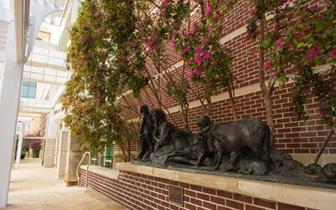
The Columbia Museum of Art will host a free Focal Points tour, Art in the Elements, on Thursday, September 18, from 11 a.m. to noon at Boyd Plaza. Participants will learn about the plaza’s history and take a closer look at several of its striking outdoor sculptures. Focal Points is a series of gallery talks highlighting topics and themes chosen by museum docents and staff.
Location: 1515 Main St., Columbia. For more information, visit ColumbiaMuseum.org/events/ focal-points-tour-art-elements.
The South Carolina State Museum invites families and friends to enjoy Summer Nights at the Museum, an after-hours event held on select Fridays this summer. The next event is Friday, September 19, from 5 to 9 p.m. Guests can explore four floors of exhibitions, including the blockbuster Heroes & Villains: The Art of the Disney Costume, featuring 70 iconic costumes worn by stars like Bette Davis, Glenn Close and Angelina Jolie.

Attendees can also watch a special film screening of Beauty and the Beast, shop in the Museum Store, and, weather permitting, visit the Observatory for evening sky viewing. Snacks will be available for purchase at The Crescent Cafe by The Food Academy and in the Museum Store.
Admission to the blockbuster exhibition requires an additional fee.
Location: 301 Gervais St., Columbia. For more information, including cost, or to purchase tickets, visit SCMuseum.org/events/summer-nights-museum.

The Columbia Museum of Art (CMA) Collection consists of four main collecting areas: modern and contemporary, European, Asian and American art. While the collection galleries are temporarily closed for an exciting revamp, visitors are invited to explore these categories in Art History 101, a casual lecture series. On Monday, September 8, and Monday, September 22, from 11 a.m. to 12:30 p.m., dive into Asian works in the CMA Collection with art historian and educator Dr. Amanda Wangwright.
Location: 1515 Main St., Columbia. For more information, including cost, or to purchase tickets, visit ColumbiaMuseum.org/events/art-history-101-asian-art-collection.

Savage Craft Ale Works hosts trivia night every Tuesday through September 30 from 7 to 9 p.m. Participants can challenge their mental and physical skills for a chance to win prizes.
Admission is free. Location: 430 Center St., W. Columbia. For more information, call 803-888-6005 or visit SavageCraft.com/ upcoming-events.

The Colonial Life Arena will host the official Pre-Game Celebration concert on Friday, September 26, at 7 p.m. The event features performances by Flo Rida, 2 Chainz, G-Eazy and Vedo.
Location: 801 Lincoln St., Columbia. For more information, including cost, or to purchase tickets, visit ColonialLifeArena.com/ events/detail/pre-game-celebration.

Every Thursday from 8 to 11 p.m., The Aristocrat, in Columbia, hosts a free jazz party featuring the Amos Hoffman Trio. The trio kicks off the evening with a set, followed by guest musicians that are invited to sit in for a lively jam session.
Location: 1001 Washington St., Columbia. For more information, visit ExperienceColumbiaSC.com/event/ jazz-party-at-the-aristocrat/68104.
A study conducted by Healthy Babies Bright Futures revealed that rice sold in stores across the United States contains toxic heavy metals. After analyzing rice samples from 145 brands across 20 metropolitan areas, arsenic was detected in all samples, and one in four exceeded the U.S. Food and Drug Administration’s limit for infant rice cereal, which is set at 100 parts per billion. There is no established threshold for non-infant rice products.
Arsenic poses significant concerns for children under 2 years of age and pregnant mothers, and it has been linked to cancer and developmental brain damage, including lower IQ. Cadmium, lead and mercury were also found in the rice samples. Although the heavy metal levels are not high enough to cause acute poisoning, the concern is that consumption of these products over a long period of time could be harmful.
To lower exposure, the study suggests cooking rice in six to 10 cups of water and draining the excess liquid to reduce arsenic levels by up to 60 percent. Rice alternatives are also recommended, including quinoa, farro and barley, which exhibit a 69 percent lower heavy metal contamination than rice. Thai jasmine, Indian basmati and California-grown rices were also recommended as safer options.

Kraft Heinz, General Mills and Nestlé have announced a voluntary commitment to eliminate all artificial food dyes from their U.S. products starting in mid-2026 and to stop using them in new products immediately. Kraft Heinz and Nestlé maintain that about 90 percent of their U.S. products are already free of synthetic dyes, with remaining efforts focused on specific items such as Nesquik Banana Strawberry mix, Kool-Aid, Jell-O and Jet-Puffed marshmallows. General Mills has indicated that their pledge will affect only 15 percent of its product portfolio and has vowed to prioritize removing the offending colors from K-12 school foods.
The move comes as federal health officials push for the phase-out of petroleum-based dyes due to health concerns, including behavioral effects in children. The Center for Science in the Public Interest continues to advocate for the implementation of warning labels on products containing synthetic dyes. Although the U.S. Food and Drug Administration recently approved new natural colorings, manufacturers face challenges in terms of cost, color intensity and sourcing.

In May, the World Health Organization adopted the “WHO Traditional Medicine Strategy 2025-2034” with the objective of facilitating universal access to traditional, complementary and integrative medicine. The organization has committed to investing in the research of ancient healing practices and their integration into conventional healthcare systems over the next decade.
While representatives from Asia, Africa, the Middle East and South America supported this global strategy, the European Union raised concerns about quality and safety standards. To alleviate fears about counterfeit products or misleading claims, the plan stipulates that no practices would be endorsed without evidence-based research, and the modalities will be codified and integrated into a regulatory framework. The blueprint also acknowledges the rights of Indigenous peoples to their traditional medicines and emphasizes the importance of sharing the benefits when their knowledge leads to commercial products.
Traditional medicine employs nature-based remedies and holistic approaches to restore balance in the mind, body and environment. Certain practices such as Ayurveda or Traditional Chinese Medicine have been developed over millennia and codified in scholarly texts. Others can be characterized as non-codified folk medicine passed down orally from generation to generation. Whether formally documented or carried forward around the campfire or kitchen table, these practices serve as the primary healthcare option for substantial populations in low- to middle-income countries and are gaining popularity in wealthier countries as complementary care.
Wars, pandemics, natural disasters and changes in trade policy can disrupt food supply chains around the world, potentially endangering the lives of millions of people. A study published in Nature Food evaluated the ability of 186 countries to achieve food self-sufficiency.
To identify deficiencies between domestic food production and the dietary needs of a country’s population, the researchers relied on food production data by the United Nations, as well as the Livewell diet developed by the World Wildlife Fund, a sustainable, predominantly plant-based eating plan that focuses on seven key food groups: vegetables, fruits, legumes, starchy foods, whole grains, lean meat and fish, and nuts.
Only Guyana was self-sufficient across the Livewell diet’s seven food groups, while China and Vietnam were self-sufficient in six groups. Only one in seven countries, mostly in Europe and South America, achieved self-sufficiency in five or more food groups, and one-third of all countries were self-sufficient in only one or two groups. Six countries, primarily in the Middle East, did not meet the needs of any food group. When grouped as an economic region, the United States, Canada and Mexico were deemed self-sufficient in five food groups.

The Schaus’ swallowtail butterfly was one of the first insects to be listed under the U.S. Endangered Species Act in 1976, and their population hit an all-time low on Elliott Key, Florida, with an estimated 56 individuals in 2007, two years after Hurricane Wilma. Historically, Schaus’ swallowtails lived throughout the Florida Keys and parts of the mainland. But habitat loss and urban development have forced them to live only on protected land on Elliott Key and Key Largo.
Travelers are exposed to potentially harmful bacteria, fungus and mold in airports, planes, hotel rooms and public restrooms. According to a study by Insure & Go Insurance Services Limited, a British travel insurance company, luggage may be the dirtiest item a traveler encounters during a trip. The company teamed up with a microbiologist to examine a sample of hard- and soft-shell suitcases at an airport train station. Swabs were taken from various surfaces of the suitcases and incubated for five days.
The study found that the suitcase wheels were the most contaminated with bad bacteria, including staph and E.coli, followed by the base and handle. The handle was found to carry 40 times more bacteria than a typical public toilet seat.
The study also identified the presence of black mold linked to musty odors, respiratory irritation and allergy triggers. Soft-shell luggage had higher fungal growth compared to hard-shelled luggage. To reduce exposure to harmful microbes on luggage, the study’s microbiologist recommended that travelers keep it off beds and tables, clean the wheels and base after each trip, cover the wheels when indoors, wash hands after handling luggage and be mindful about where the luggage is wheeled.


A study by scientists from the Florida Museum of Natural History examined 35 years of data on the butterfly and found that they unexpectedly benefit from hurricanes. The swallowtails rely on torchwood and wild lime plants for food and to lay their eggs. These plants live in the understory of the forest where there is little filtered light. However, when the branches and leaves on taller trees are temporarily knocked out after a hurricane, torchwood and wild lime experience a rapid growth of fresh leaves. The tender shoots and leaves mean more butterflies. The most recent estimate of the Schaus’ swallowtail butterfly population on Elliott Key is 4,400 individuals.
Families that rely on single-use plastics and prepackaged foods for their children’s lunches often overlook the tremendous amount of daily waste they generate. With a few easy swaps, lunch packing routines can be fun, eco-friendly rituals for the back-to-school season. By replacing disposable plastics with reusable alternatives and adding a few homemade snacks, parents can save money and safeguard kids’ health while reducing landfill waste. Here are some excellent options.
• Stainless steel lunchboxes
• Compartmentalized bento boxes made of wood or stainless steel

• Leakproof and dishwasher-safe silicone pouches
• Cloth or compostable snack bags for dry goods such as nuts or pretzels
• Repurposed glass jars with lids for drinks, hummus or applesauce
• Stainless steel water bottles that keep liquids hot or cold for extended periods of time
• Beeswax wraps or soybean-based “wax” paper to secure sandwiches
• Reusable cutlery and chopsticks made of stainless steel and bamboo
• Biodegradable and compostable cutlery made of renewable starch sources such as corn or cassava
Bulk
• Nuts and seeds, dried fruits, trail mix, crackers, healthy chips and granola from bulk bins
• Sandwiches on whole grain breads made from scratch with fresh, healthy ingredients
• Locally sourced, seasonal produce and bread from the farmers market for a lighter carbon footprint
• Easy parfaits made with milk- or plant-based yogurt, chopped fruits, nuts, flax or chia seeds and a drizzle of local honey

• Wraps made with soft tortillas, lettuce or cabbage leaves, or nori sheets filled with yummy fresh ingredients such as sautéed or shredded raw vegetables, nut butters, bananas, Medjool dates, soft cheeses, olives or hummus
• Homemade energy bars packed with healthy ingredients, including oats, protein powder, dark chocolate chips, nuts, dried fruit and maple syrup
• Fun and colorful cloth totes purchased new or at thrift stores
• Recycled insulated lunch bags
• Organic cotton lunch bags

by Michaela Leung
Columbia’s wellness landscape is evolving rapidly, with practitioners embracing a holistic vision of health that integrates body, mind and spirit. As new modalities and scientific advances shape our understanding of well-being, the city is becoming a hub for innovative practices that encourage prevention, resilience and longterm vitality.
One of the fastest-growing areas is lymphatic drainage therapy. The lymphatic system supports immune function, removes toxins and helps maintain fluid balance. When it is functioning optimally, the body is better equipped to fight illness and recover from stress. Manual and device-assisted techniques are intended to stimulate lymph flow, which may aid detoxification, reduce inflammation and promote overall energy. This approach is often recommended for those recovering from surgery or injury, as it may help decrease swelling and support healing.
Another emerging focus is nervous system regulation. The demands of modern life, along with the effects of chronic stress or trauma, can keep the nervous system in a state of overactivity. This imbalance can
contribute to fatigue, anxiety and reduced physical resilience. Restorative therapies are being used to address this need.
Meditation-focused environments encourage deep relaxation and help the body shift into a state of rest and repair. Gentle chiropractic adjustments, CranioSacral Therapy and sound healing experiences are used to release stored tension, support relaxation and promote a sense of mental clarity. Some practitioners also believe these approaches may help improve circulation of cerebrospinal fluid. Together, these therapies aim to restore balance, enhance emotional stability and create a stronger foundation for overall health.
Columbia is also seeing increased interest in longevity and antiaging treatments. People are seeking ways to feel younger, not just in appearance but in energy, strength and cognitive sharpness. Nicotinamide adenine dinucleotide (NAD+) intravenous (IV) therapy is promoted as a way to support cellular repair, increase mitochondrial efficiency and improve brain function.
Cold-based therapies such as cryotherapy are often promoted for their potential
to decrease inflammation, speed muscle recovery and boost metabolism, making them popular with athletes and individuals focused on overall wellness. Infrared sauna sessions provide a gentler heat than traditional saunas and are believed to aid detoxification, improve circulation and contribute to skin health. When combined with personalized nutrition and functional medicine, these therapies are presented as part of a comprehensive approach to supporting the body’s natural processes as it ages.
What makes Columbia’s wellness evolution unique is the way ancient traditions are blending with modern science. Techniques rooted in massage, breathwork and meditation are finding common ground with advanced treatments like IV nutrient therapy and light-based modalities.
The emphasis is increasingly on proactive care. Rather than waiting for illness or imbalance to appear, more people are seeking out services that support the body’s systems in functioning smoothly. Whether it is improving lymphatic flow, regulating the nervous system or supporting cellular health, these modalities share a common goal: helping people feel their best every day.
The future of wellness in Columbia looks bright. Its offerings are becoming more inclusive and diverse. By uniting time-tested practices with scientific innovation, the community is creating a culture where health is about cultivating vitality, balance and a sense of connection between body, mind and spirit. For those that call Columbia home, this shift promises not only a longer life but a richer, more fulfilling one.
Michaela Leung is a multimedia storyteller, wellness writer and Pilates instructor based in Columbia. She is passionate about making holistic wellness more accessible—whether through movement, mindful living or sharing stories that inspire. Leung is the founder of All is Well, a wellness platform and newsletter, and she is a 2025 Columbia ambassador dedicated to supporting local businesses and healthy living. To connect with her, email MichaelaAngeliqueLeung@gmail.com or follow @michaelaleung__ on Instagram.
by Chloe Karydes Krecun
Afruit shrub is a sweet and tart syrup made by combining fruit, sugar and vinegar. Used for centuries as a way to keep nutrients alive, these tangy, fermented syrups are becoming popular again as irresistible additions to cocktails and mocktails, while also contributing to gut health.
Long before fruit shrubs became a trendy addition to modern beverages, fermenting fruits in alcohol or vinegar was one of humanity’s oldest preservation techniques. Resourceful cooks combined seasonal fruits with vinegar and sugar to create potent elixirs that captured the fleeting abundance of summer harvests in shelf-stable form.
When winter’s grip tightened and fresh produce became scarce, these preserved fruits provided delicious flavors and vital nutrients. Today’s food enthusiasts celebrate fruit shrubs for their complexity and versatility in everything from sodas to salads and other inventive side dishes.
Each ingredient in a fruit shrub plays a distinct role in both preservation and nutrition. “The vinegar component in shrubs is what helps preserve the fruits and keep them from spoiling,” explains Lea Ann Chen, M.D., assistant professor of gastroenterology at the Rutgers University Robert Wood Johnson Medical School. “However, the total amount of fruit in shrub recipes is relatively modest. Thus, the benefits of eating fresh fruits would be much higher. For example, fresh whole fruit contains fiber, which has many health benefits, but this is mostly missing in shrubs.”
Chen notes that the fruit in shrubs is nevertheless a source of certain vitamins, such as vitamin C in citrus fruits, while berries are also high in polyphenols, which offer anti-inflammatory properties. A 2021 Stanford University study published in the journal Cell found that consuming fermented foods may increase gut microbiome diversity and decrease inflammation, so the fermentation of fruit shrubs may be part of a gut-healthy diet.
According to Kirsten Shockey, the author of several books on fermentation, including Fermented Vegetables, fruit shrubs and mocktails serve as a practical steppingstone toward healthier drink choices. They offer a middle ground for those seeking to improve their habits by steering away from soda and alcoholic beverages without making dramatic changes.
Creating gut-friendly fruit shrubs at home requires nothing more than fresh fruit, sugar, vinegar and patience. Morgan Shortt, sales director at Pink House Alchemy, a maker of farm-to-table simple syrups, aromatic bitters and shrubs, explains that the sugar breaks down the fruit and naturally turns it into a thick, viscous syrup without having to smash the fruit. This natural maceration process allows the sugar to draw out fruit juices and flavors over the course of a couple of days.
Once macerated, the fruit is strained through cheesecloth or a coffee filter. The syrup can be used immediately as a topping on desserts or savory dishes. To make it last longer and add the tart taste, vinegar is incorporated. Almost any type can be used, depending on personal taste. White vinegar is intensely sharp; apple cider vinegar provides a mild, fruity flavor; and balsamic can add depth to berry shrubs with only a splash. The higher the quality of vinegar, the better the results, Shockey points out.
Although fruit shrubs are shelf stable, the shelf life varies depending on the ingredients. Shortt estimates that her shrubs have a shelf life of at least two years. Refrigeration can help maintain the quality and flavor for a longer period of time.

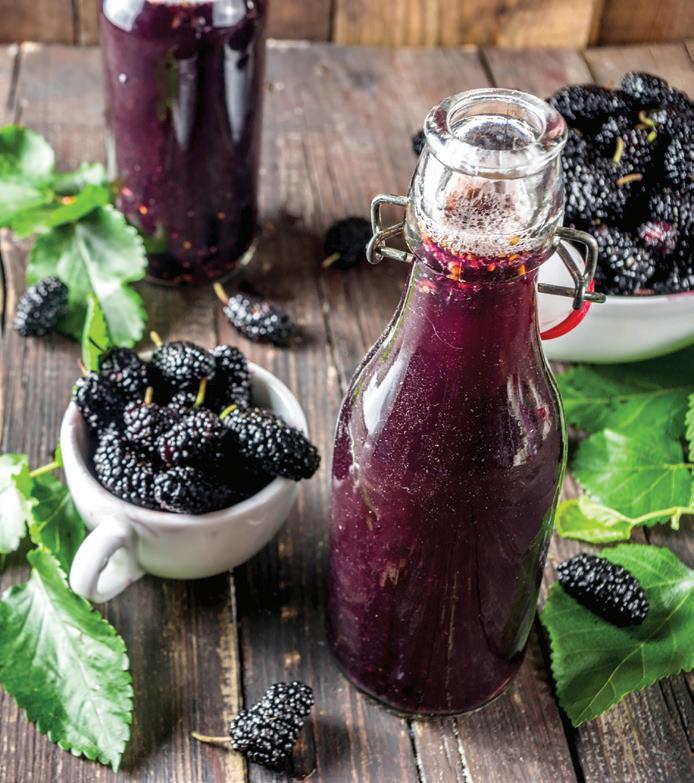
Shrubs offer a practical solution for reducing food waste. They are a good way to use seasonal fruits that may be bruised or considered a farmer’s seconds. “The key takeaway is that it’s an easy and affordable way to consume a gut-healthy product, and it’s delicious,” says Shortt.
For those preferring convenience over homemade preparation, shrubs are increasingly available at farmers markets, health food stores and online. When purchasing, prioritize products containing raw, unpasteurized vinegar and minimal added sugar while checking for clean-ingredient labels.



Premixed shrub drinks are also available in ready-to-consume cans or bottles for the ultimate in convenience.
Shrubs represent a delicious intersection of ancient preservation wisdom and modern wellness needs. Whether crafted at home or purchased ready-made, these tangy syrups offer a simple way to support gut health while adding flavor to drinks and recipes.
Chloe Karydes Krecun is a sophomore at University of Illinois UrbanaChampaign. Connect at LinkedIn.com/in/ chloe-karydes-krecun.
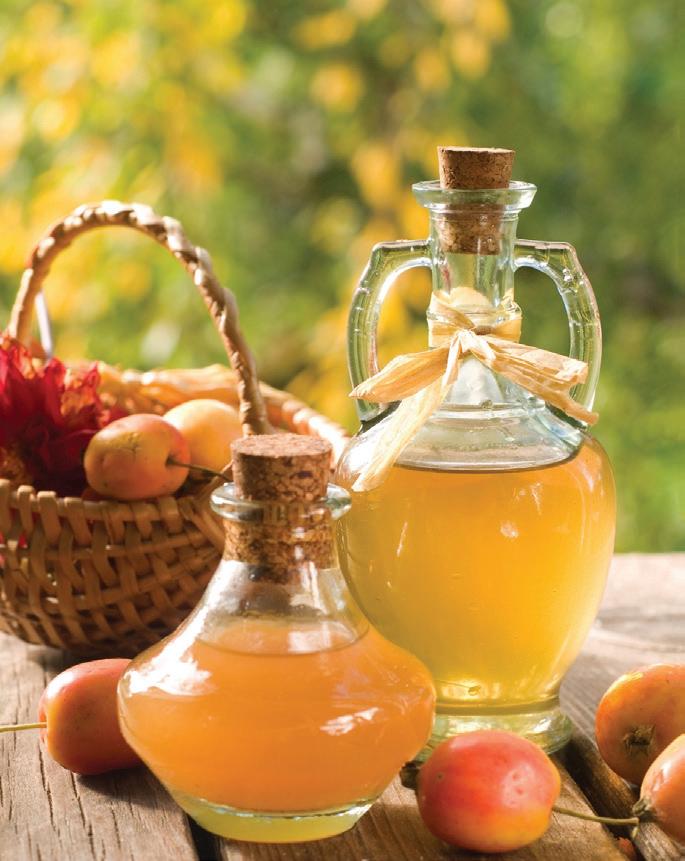
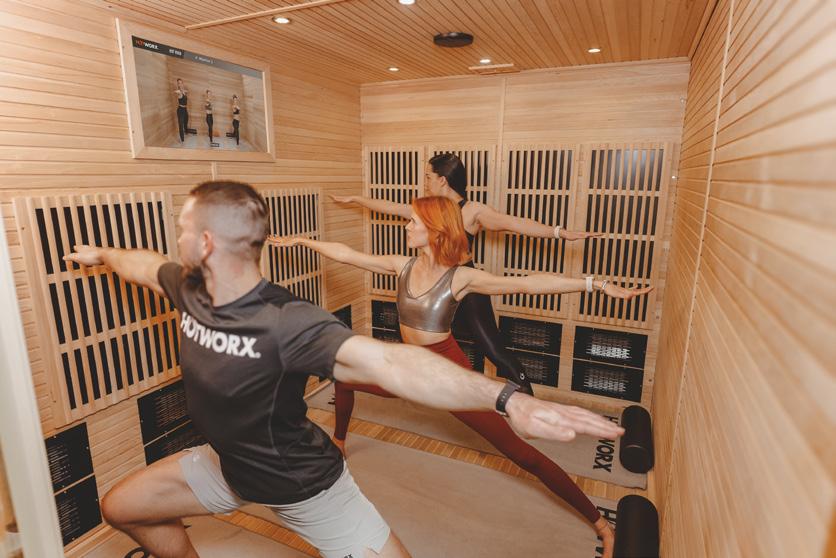







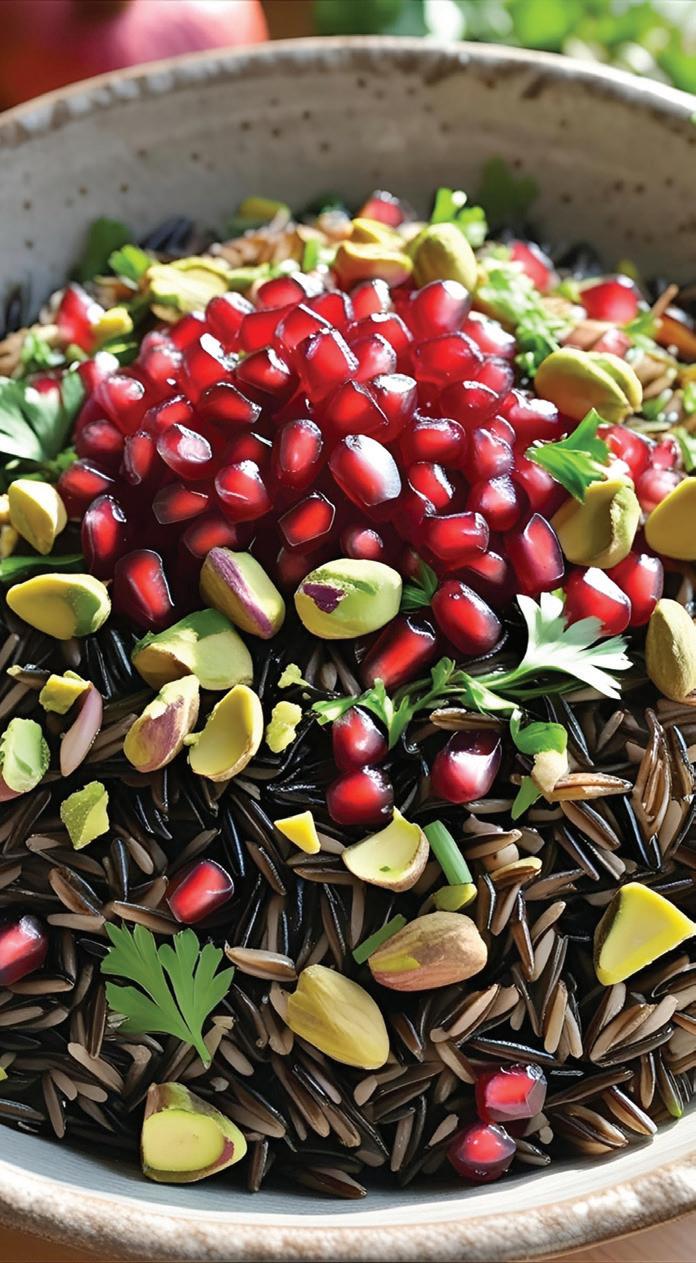

Preheat the oven to 400° F.
Whisk all the vinaigrette ingredients together in a small bowl and set aside.
Toss the sweet potato cubes with a drizzle of olive oil and salt and pepper, to taste. Spread sweet potato cubes on a baking pan lined
YIELD: 6 TO 8 SERVINGS
FOR THE VINAIGRETTE
2 Tbsp pomegranate shrub
2 Tbsp extra virgin olive oil
2 Tbsp shallots, finely chopped
1 tsp lemon zest
1 tsp honey or liquid sweetener
½ tsp fresh ginger, grated
½ tsp ground coriander
Kosher salt, to taste
Fresh ground black pepper, to taste
FOR THE SALAD
1½ cup cooked wild rice
1 cup pomegranate arils (about one large pomegranate)
1 cup pistachios, coarsely chopped
½ cup parsley, coarsely chopped
In a small bowl, combine pomegranate shrub, olive oil, shallots, lemon zest, honey, ginger, coriander, salt and black pepper. Set aside.
Combine wild rice, pomegranate arils, pistachios and parsley in a serving bowl. Add dressing and toss to combine. Taste and season with additional salt and pepper, if desired. Serve immediately or refrigerate for up to three days.
Recipe courtesy of Priscilla Koch, founder of The Urban Farmhouse Co., makers of organic shrub beverages.
YIELD: 4 TO 6 SERVINGS
FOR THE VINAIGRETTE
2 Tbsp apple spice shrub
2 Tbsp extra virgin olive oil
1 tsp Dijon mustard
½ tsp raw honey or maple syrup
1 squeeze of orange, optional
Sea salt, to taste
Fresh black pepper, to taste
FOR THE SALAD
1 cup cooked farro
1 sweet potato, cubed
Extra virgin olive oil for roasting
A few kale leaves, chopped 2-3 cups salad greens
with parchment paper and roast until golden brown, about 35 minutes. Once roasted, let the sweet potato cubes cool.
In a large bowl, lightly massage the kale with a bit of the vinaigrette until the kale wilts down. Mix in the farro and sweet potato cubes. Add the salad greens, carrots, apple,
1-2 carrots, peeled into ribbons
1 apple, diced
A few radishes, sliced thin
Small handful parsley, chopped
½ cup almonds, chopped and toasted
Salt, to taste
Fresh black pepper, to taste
radishes, parsley and almonds to the bowl and toss with vinaigrette. Add additional salt and pepper, to taste.
Recipe courtesy of Priscilla Koch, founder of The Urban Farmhouse Co., makers of organic shrub beverages.
YIELD:
FOR THE VINAIGRETTE
2 tsp garlic, finely minced
1 tsp Dijon mustard
4 Tbsp fig shrub
4 Tbsp extra virgin olive oil
1 tsp raw honey, optional Sea salt, to taste
Freshly ground black pepper, to taste
6 cups sourdough bread, cut into 1-inch cubes
Preheat the oven to 350° F.
1 pattypan squash, cut into 1-inch cubes
1 zucchini, cut into 1-inch cubes
1 delicata squash, cut into 1-inch cubes
1 yellow squash, cut into 1-inch cubes
1 acorn squash, peeled and cut into 1-inch cubes
1 medium red onion, diced
1 cup cherry tomatoes, halved
5 oz mozzarella balls, medium or small sized, quartered
20 large basil leaves, ribbon sliced
1 tsp kosher salt
Whisk all the vinaigrette ingredients together in a small bowl and set aside.
Roast the delicata and acorn squash in the oven for 20 minutes on a baking pan lined with parchment paper.
Add the patty pan, yellow squash and zucchini to the same baking pan. Sprinkle 1 teaspoon of kosher salt over the vegetables and continue roasting for another 15 to 20 minutes. Remove and let vegetables cool.
Place bread cubes on a separate baking pan lined with parchment

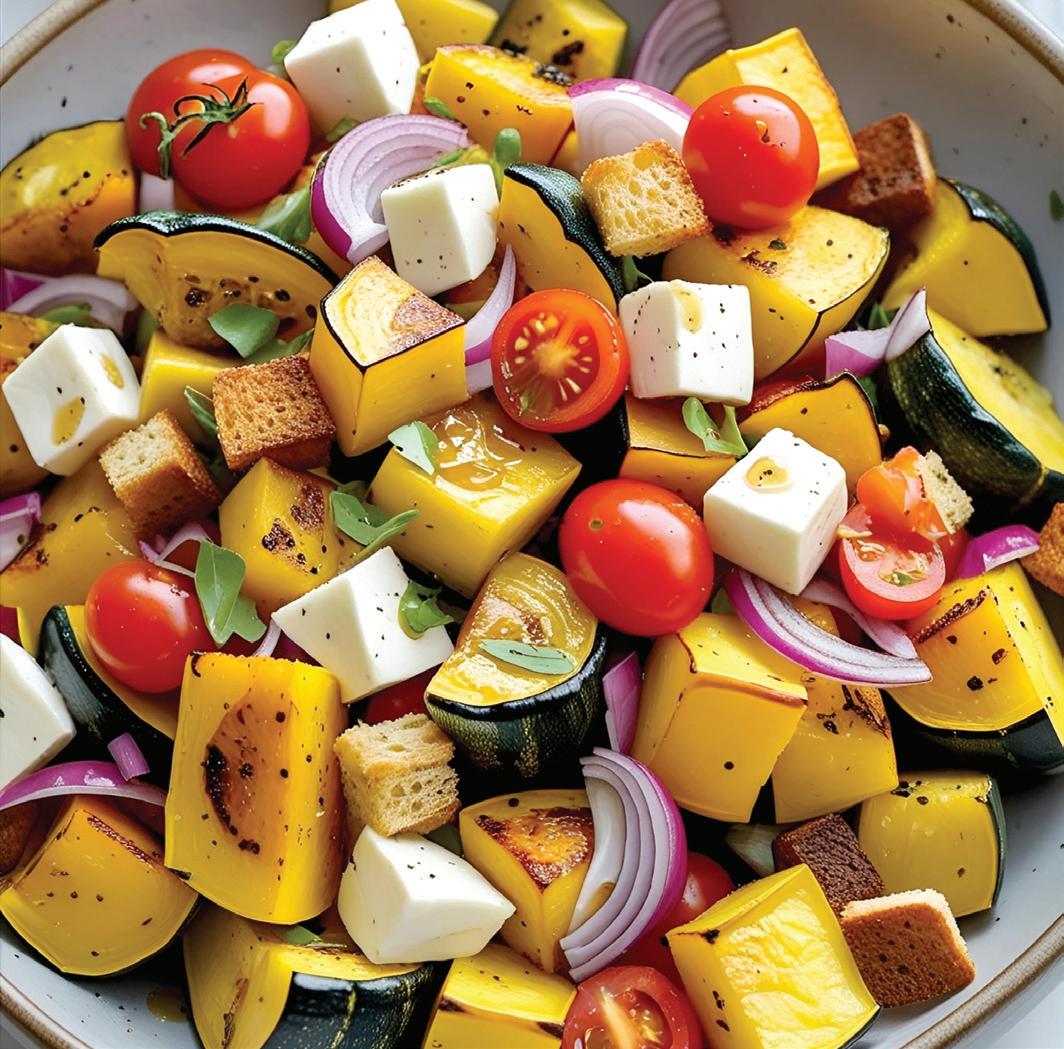
paper and place in oven for 10 to 15 minutes. Remove and let bread cool.
In a large bowl, mix the roasted vegetables, red onion, cherry tomatoes and basil. Add the bread cubes and toss with the vinaigrette. Add kosher salt and pepper to taste. Serve immediately or allow the salad to sit for half an hour for the flavors to blend.
Recipe courtesy of Amy Lawson, a registered dietitian at ThriveNutritionRDN.com.


by Hannah Tytus
“The gut is the first to encounter the universe, and it is the first line of defense between you and the universe,” says Dr. Madiha Saeed, a holistic, functional and integrative doctor in Naperville, Illinois, and director of education for Documenting Hope and KnoWEwell. Home to trillions of bacteria, fungi and other microbes, the digestive tract
forms a complex ecosystem known as the gut microbiome, which influences many aspects of health.
Microbes perform numerous functions. They help break down food, produce essential nutrients, support the immune system and influence mood, cognition and overall well-being. Diet, stress, sleep, medications

and environmental exposures shape the makeup of our gut microbiota, which, in turn, impact the body’s propensity for health or disease. Efforts to restore and nurture gut health offer opportunities for us to enhance our well-being through simple lifestyle changes.
The intestinal environment is constantly changing, with new microbes entering and others disappearing daily, creating a dynamic community of tiny organisms that is unique to every individual. Different species have specialized roles. For instance, Faecalibacterium prausnitzii lowers inflammation by nourishing gut cells, while Akkermansia muciniphila maintains the gut lining by breaking down mucus and supporting helpful bacteria. Each person hosts approximately 1,000 distinct microbial species, while humanity collectively harbors more than 10,000 species.
Like a garden, the gut microbiome contains a mix of helpful and harmful organisms. Beneficial microbes behave like healthy plants, supporting digestion, nutrient absorption and immune function. When cared for, these helpful organisms thrive, while also helping to keep harmful microbes (weeds) under control.
Our intestinal garden is shaped by how it is tended. Fiber-rich foods, fermented products and exposure to natural environments help nourish the good microbes, much like water, sunlight and compost nourish plants. By contrast, processed foods, excessive sugar and unnecessary antibiotics can disrupt the balance and allow harmful microbes to take over.
Many people experience gut imbalance, or dysbiosis, without realizing it. The gut is highly sensitive to its environment, and everyday choices like processed foods, medications and chronic stress can quietly disrupt the inner balance, making it harder for beneficial microbes to thrive.
Medications. “Though some medications can save your life, they do come with a side disadvantage, so you need to weigh your
risks versus the benefits when it comes to taking any medications,” Saeed advises, noting that antibiotics, for example, reduce microbial diversity and richness, causing short-term changes in the microbiome. While most people recover within two months, their microbiota diversity and productivity may remain low, and some people may experience longer-lasting disruptions.
Common painkillers called nonsteroidal anti-inflammatory drugs (NSAIDs) such as aspirin and ibuprofen can also interact with the composition and function of the gut microbiome. They inhibit microbial growth, induce microbial cell death and increase gut permeability. NSAIDs can also interact with gut microbes, thereby impacting how well the drug is absorbed.
Foods. The food we eat significantly impacts the microbiome’s composition and metabolism. “Real foods nourish the good bugs, while processed foods fuel the bad,” says Saeed. Diets high in processed foods, sugars and additives create a toxic load that disrupts bacterial balance and triggers inflammation, leading to chronic disease. Eating these kinds of ingredients on a consistent basis can slowly damage the gut, as harmful microbes crowd out beneficial species, weakening the intestinal ecosystem over time without immediate signs of distress.
Stress. Chronic stress is another gut health disruptor. Stress hormones can reduce beneficial bacteria such as Akkermansia muciniphila, which has been identified as a potential protector against obesity and Type 1 diabetes. Stress also encourages yeast overgrowth, leading to inflammation and intensifying the stress response in a vicious cycle. Studies also show that stress, whether physical or perceived, can alter overall microbial composition.
A 2018 narrative review published in Frontiers in Microbiology analyzed existing preclinical studies and found that various psychological, environmental and physical stressors can alter gut microbiota composition and function. Furthermore, a 2023 systematic review published in Neuropsychobiology found that higher perceived stress was associated with lower microbial diversity and decreased abundance of beneficial genera such as Lachnospira, Veillonella and Phascolarctobacterium. Harmful bacteria like Methanobrevibacter rose in relative abundance in stressed individuals.
Indications of an unhealthy gut show up in various ways. Digestive issues such as bloating, gas and constipation often signal an imbalance. Fatigue, mood swings and skin conditions like acne or eczema may also be related to poor gut health. Unexplained weight changes, cognitive problems and food sensitivities may be caused by intestinal distress. A weakened immune system, trouble sleeping and bad breath can also indicate a need for gut support.
Environmental factors influence the microbiome more than

let our advertisers know you found them
genetics, but when the gut has been harmed, Saeed explains, restoration takes more than just a probiotic.
Eat organic whole foods. “Food is medicine. Every bite can either help or hurt,” counsels Saeed, emphasizing the importance of daily food choices. Like humans, gut microbes need nourishment to thrive. When they eat well, human health flourishes. The typical Western diet is high in simple carbohydrates and fat, but low in fiber, offering little nourishment for beneficial microbes.
On the other hand, microbiota-accessible carbohydrates (MACs) such as legumes, root vegetables, fruits, nuts and seeds are essential for a diverse and resilient microbial community. Because MACs are not broken down by digestive enzymes, they are fermented by gut microbes, feeding and promoting the growth and activity of beneficial bacteria.
Choosing organic produce helps avoid synthetic pesticides and herbicides sprayed on produce to eliminate pests and weeds. These chemicals have been shown to negatively affect the gut microbiome and human health. “It’s best to eat local food that is not sprayed,” advises
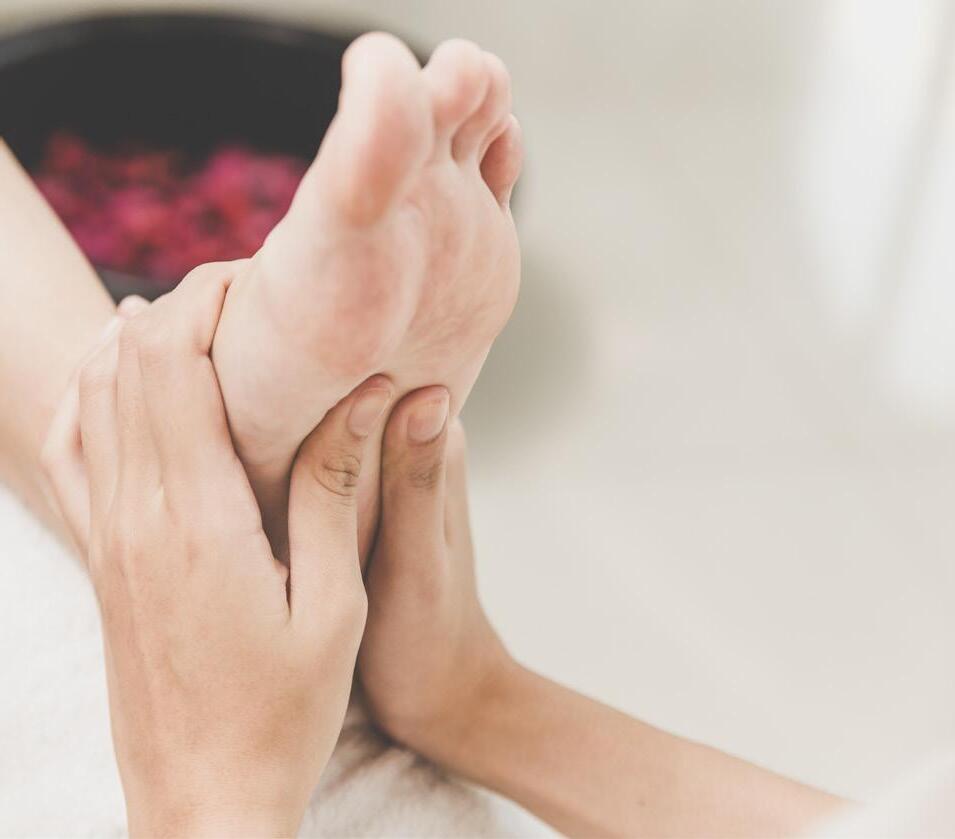




Dr. Patrick Hanaway, a board-certified functional medicine family physician, educator and chief medical officer of KnoWEwell.
Supplement wisely. Probiotics and prebiotics are vital for healing the gut. Probiotics, whether found in foods like yogurt and other fermented products or taken as supplements, introduce live bacteria into the body. Prebiotics act like fertilizer, feeding good bacteria and helping restore overall balance. Fiber-rich foods such as asparagus, bananas, garlic, onions, oats, apples and legumes naturally support a thriving gut ecosystem.
As Hanaway explains, “A probiotic is a live bacteria that can be ingested and move into the stomach and populate the body. A prebiotic is a component that helps feed the commensal [beneficial] bacteria in the gut. Probiotics are highly specific. They have great benefits for specific strains for specific diseases in specific doses. Yet, the probiotic is a tourist; it doesn’t stay in the body. It’s great to have tourists in the economy, but if an economy becomes entirely dependent on tourism, it becomes a problem.”
When choosing supplements, quality matters. Due to limited regulations, it is best to purchase from reputable brands. Supplements in fillable capsules tend to have fewer fillers and more active ingredients. Vitamins and minerals are best absorbed from whole foods, so supplements should complement, not replace, a balanced diet.
Start a garden. Gardening increases the availability of fresh, fiber-rich, seasonal fruits and vegetables in the diet, but the very act of putting our hands in the dirt may also help increase the diversity of our gut microbiome. A 2022 cohort study of 19 families over one growing season by scientists at the University of Illinois and published in the journal Nature found that when compared to non-gardeners, families that grew plants and produce in their backyards had more gut bacteria linked to fiber fermentation, greater microbial diversity and even some microbes in their guts that appeared to come from the soil. Families that gardened also ate more fiber-rich foods.
Commit to small actions. Healthy microbiomes grow with consistent care—not perfection—and even small lifestyle changes can build a more resilient ecosystem for better overall health. There is no magic bullet for healing the gut. The key is to commit one hour a week to health education and to small actions focused on rebuilding the inner ecosystem one change at a time.
“A strictly-diet approach isn’t the answer; a lifestyle approach is,” says Dr. Tom O’Bryan, an expert on food sensitivities, environmental toxins and the development of autoimmune diseases, as well as the host of the Regenerative Whole Health Show at KnoWEwell.com. “Dietary regimens can go
only so far if something else persists, like mold in the house, high glyphosate levels or accumulated mercury in the body.” Addressing the macrocosm around us helps fix the microcosm inside us.
Indoor air filtration and water purification measures might be necessary to counteract an unhealthy indoor environment. Small changes like storing leftover food in glass rather than plastic can help keep harmful compounds out of the gut. Herbs such as chamomile and holy basil in diffusers and teas may aid the chronically stressed. Even simply chewing our food slowly, with mindfulness and gratitude, can help aid the digestion process.
The gut microbiome is a complex ecosystem that plays an essential role in overall health. Understanding what it is, what harms it and how to recognize signs of imbalance empowers us to take practical steps to restore and maintain gut health. By nourishing the microbiome with whole foods, managing stress, using supplements wisely and embracing small lifestyle changes, individuals can cultivate a resilient inner garden that supports well-being for life.
Hannah Tytus is a researcher and content creator for KnoWEwell, P.B.C. and former technical writer for the National Institutes of Health’s National Center for Complementary and Integrative Health.





by Maya Whitman
Some may associate seaweed with giant kelp forests or savory sushi wraps, but these species of multicellular marine algae have become key players in the food, cosmetic and industrial arenas. Seaweed farming around the world, including more recently in the United States, shows promise as a natural solution to climate change, ocean acidification and the plastics crisis. Such crops provide not only
nutritious food for humans and animals but also chemical-free fertilizers for backyard gardens and agriculture.
“When managed and cultivated ethically in cooperation with the natural laws, just like land farms, seaweed farms can be little vibrant plots of biodiversity and primary productivity, supporting all the powers of nature for good,” says Sarah Redmond, founder of

Springtide Seaweed, in Gouldsboro, Maine, the largest organic seaweed company in the United States.
There are thousands of species of seaweed, and they thrive in areas where other marine life is failing due to ocean acidification. Their presence is a boon for the environment because they release nutrients into the ocean, while also sequestering carbon from the atmosphere, thereby reducing the effects of climate change.
As Redmond explains, “Ocean acidification is the lowering of overall pH in the oceans, which can impact all marine life, especially shell-forming organisms. Growing seaweed can help reduce the impacts of acidification locally, during the day, when the plants are taking in carbon for photosynthesis. Some of the carbon is remineralized back into inorganic forms, some is consumed as food, some is lost as dissolved or particulate organic carbon, and some is buried in sediments at sea. All of the algae—micro and macro seaweeds—drive the ocean’s carbon cycle.”
Seaweed is introduced in aquaculture because of its ability to boost water quality and convert fish waste into usable nutrients. According to Charles Yarish, professor emeritus of marine ecology at the University of Connecticut and chief scientist with GreenWave, a global nonprofit network of regenerative ocean farmers, “Seaweed farming in the United States is principally kelp farming, and we have nutrient-rich waters. Seaweeds can reduce carbon dioxide and nitrogen as

they photosynthesize during daylight hours and take it into their biomass.”
Yarish highlights the cutting-edge efforts of Macro Oceans, in West Sacramento, California, which seeks to help the world transition away from petroleum-based products by developing eco-friendly biomaterials from seaweed for use in cosmetics, food and other industries.
“Seaweeds are very nutritious, with minerals, protein and vitamin C,” says Yarish. Rich
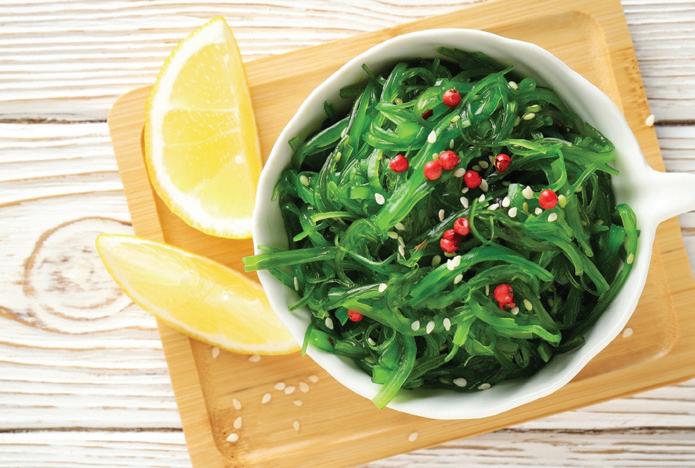

in iodine, it has been a diet staple for coastal cultures since prehistoric times, and more than 145 varieties are consumed worldwide today. Across the United States, there are dozens of farms in New England, Alaska and the Pacific Northwest that specialize in the cultivation of bull kelp, dulse, ribbon kelp and sugar kelp used in sauces, salads, seasonings and Asian cuisine.
According to Redmond, “By replacing table salt with the natural, organic mineral salts from seaweeds, we can rebalance our sodium and potassium levels and add essential micronutrients to our diets.”
Common edible seaweeds like wakame, kelp, kombu, nori and dulse are tasty additions to soups and salads that can foster good thyroid health. According to 2018 findings published in the Iranian Journal of Basic Medical Sciences, extract of the seaweed variety Sargassum oligocystum offers anti-diabetic effects in rats and is worthy
Sanctuary for the Feminine
Peaceful Pause is a Holistic Healing Space Where Every Woman Can Heal, Grow and Thrive

of further research. Japanese research published in 2021 in the Journal of Atherosclerosis and Thrombosis suggests that seaweed consumption might be valuable in preventing strokes in men.
According to CleanHub, an organization dedicated to preventing plastic pollution in our oceans, it is estimated that 95 percent of all beauty industry packaging is thrown away every year. Companies like UK-based Notpla and Kelpi, as well as California-based Sway, are using biodegradable seaweed bioplastics to make a difference. Similarly, the restaurant and food industries are developing options to replace single-use plastics like containers and wraps with marine-based packages. Currently, seaweed packaging is more costly, but experts predict lower prices as technology advances.
Maya Whitman is a frequent writer for Natural Awakenings.

by Jordan Peschek, RN-BSN
The gut, often called the second brain, plays a pivotal role in not only digestion, but also immune function and mental well-being. With a growing body of research exploring the gut-brain axis, many are turning to yoga not just as a physical discipline, but as a therapeutic modality to support gut vitality.
Yoga traditionally involves eight components, including postures, breath control, concentration and meditation. The yoga postures can be practiced in many ways, from flowing sequences and strengthening postures to very slow stretches that can be held for minutes at a time, focusing on breath and meditation simultaneously.
Emerging evidence suggests that yoga may positively influence gastrointestinal health by modulating the autonomic nervous system. Through its emphasis on breathwork and relaxation, yoga activates the parasympathetic nervous system—often referred to as the rest-and-digest mode—helping to promote digestion and reduce stress, a known aggravator of gastrointestinal symptoms, such as those experienced with irritable bowel syndrome (IBS).
A 2015 12-week, randomized, controlled trial published in the European Journal of Integrative Medicine demonstrated significant improvements in IBS symptoms, anxiety,

physical flexibility and autonomic function in patients practicing a gentle form of yoga compared to controls.
Certain yoga poses specifically support digestive function. According to the Indian yoga teacher B.K.S. Iyengar in his seminal book, Light on Yoga, twists such as ardha matsyendrasana (half lord of the fishes) and supta matsyendrasana (supine spinal twist) gently compress and massage abdominal organs, stimulating the movement of food through the digestive tract and encouraging waste elimination. Forward folds like paschimottanasana (seated forward bend) can soothe the nervous system while enhancing circulation to digestive organs.
Practicing viparita karani (legs up the wall) after meals may promote lymphatic drainage and calm inflammation, especially when paired with diaphragmatic breathing. Virasana (hero pose) after eating can also support digestion and, because the spine is upright in this posture, is ideal for those with acid reflux.
“When supporting clients with digestive concerns, I incorporate yoga postures and breathwork to encourage healthy, balanced digestion,” explains Katie Mullins Denk, a yoga instructor, Ayurvedic health counselor and owner of Moonflower Studio, in Brookfield, Wisconsin. “Apanasana (knees to chest) helps relieve gas and bloating; supta matsyendrasana (supine spinal twist), malasana (garland or yogi squat) and surya bhedana (right nostril breathing) help stimulate elimination. Lying on the left side after

meals—a version of savasana (final rest or corpse pose)—supports digestion through rest and relaxation. These simple, intentional practices create space for healing from within.”
Mind-Gut Connection
Yoga’s impact extends beyond posture. Mindfulness practices such as pranayama (breath control) and dhyana (meditation) cultivate interoception—the ability to sense internal bodily states. This deepened awareness can promote healthier eating habits, support mindful digestion and reduce overeating. Mullins shares, “Uttanasana (standing forward fold), seated forward fold and nadi shodhana (alternate nostril breathing) help calm the nervous system.”
Chronic stress is a major disruptor of gut flora, and yoga has been shown to reduce cortisol levels, the primary stress hormone. A calm mind often translates into a calmer gut. Digestive health can be tied to the body’s natural circadian rhythm. By practicing sun salutations
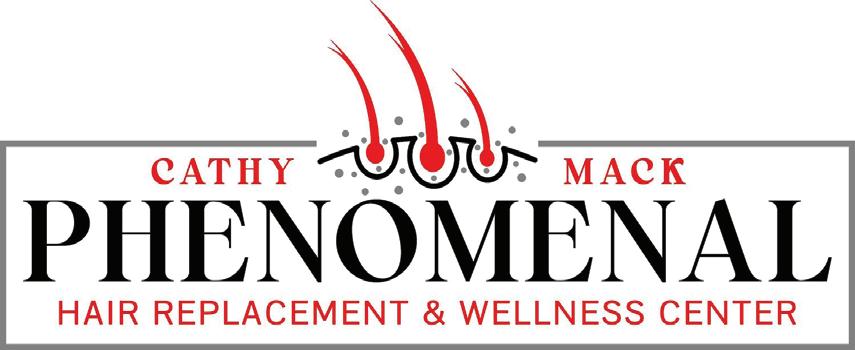
or flowing yoga postures in the morning, the metabolism is gently awakened, and by incorporating restorative yoga or stretches in the evening, we signal our body to wind down naturally.
As an integrative tool, yoga complements both conventional and alternative therapies for gut health. It works synergistically with dietary modifications, probiotics and functional medicine interventions. For individuals navigating gastrointestinal disorders— from bloating and constipation to chronic conditions like Crohn’s disease—yoga offers a noninvasive, accessible practice with minimal side effects.
Yoga practice was found to improve constipation and sleep quality in a 2021 randomized, controlled trial with elderly adults published in the Journal of Bodywork and Movement Therapies. A 2019 systemic review and meta-analysis in the Journal of Psychosomatic Research found that mindfulness interventions, including yoga, reduced stress and improved depression and quality of life in participants with irritable bowel disease.
Gut vitality is foundational to overall well-being. Yoga, with its blend of movement, breath and mindfulness, offers a holistic path to digestive harmony. Whether practiced in a studio, on a living room floor or during a midday break, it invites each person to tune into their body’s wisdom and support the healing journey from the inside out.
Jordan Peschek has a background in personal training, yoga instruction and mental health nursing. She publishes the Milwaukee and Twin Cities editions of Natural Awakenings.

by Marlaina Donato
An estimated 42 percent of adults aged 30 and above are affected by periodontitis, commonly known as gum disease. For some, the condition manifests as mild, reversible gingivitis, while others experience a more progressive form that can lead to bone loss.
Beyond its effects in the mouth, gum disease is strongly associated with chronic inflammatory conditions such as cardiovascular disease, diabetes and arthritis. A study conducted by the University of Toronto in 2020 found that the body’s immune response to gum disease can trigger a hyper-inflammatory response that can negatively impact healthy tissues and organs.
Good oral hygiene and regular cleanings with a dental professional are the principle ways to prevent and treat gum disease. However, new findings suggest that stress management techniques such as mindfulness and yogic practices, combined with conventional treatments, may be the future of whole-body periodontal care and another good reason to get on the yoga mat.
Research published this year in BMC Oral Health reported that elevated levels of the stress hormone cortisol may impact periodontal health by making the gums more susceptible to infection and inflammation. Stress may also lead to lapses in oral hygiene.

“In itself, inflammation isn’t a bad thing—it’s how the body protects and heals itself after injury, illness or exposure to harmful substances. But when that inflammatory response doesn’t turn off due to physical or emotional stress, the body stays in a constant state of defense, even when there’s no real threat present,” explains yoga teacher Jamie LiCausi, owner of Empowered Alignment Holistic Healing Hub, in Hawley, Pennsylvania. “Many of us live in a constant state of low-grade stress without even realizing it. Yoga isn’t just about finding your zen; it quite literally rewires your nervous system to help you handle stress differently.”
A 2023 systemic review published in the Journal of International Society of Preventive and Community Dentistry found promising potential for yoga to improve periodontal health by reducing systemic stress reactions and periodontal disease risk factors such as diabetes and hypertension.
Dr. Amy Dayries, an integrative dentist in Roswell, Georgia, and host of KnoWEwell’s monthly online show, Healthcare From Your Dentist’s Chair, asserts that yoga can reduce stress-induced teeth grinding, mouth breathing and poor posture promoted by modern lifestyles. Relying on mouth breathing rather than nose breathing can lead to sleep apnea, dry mouth and a misaligned bite, which, if left untreated, may cause tooth decay and gum disease. “Dentally speaking, we see increases in gum inflammation and increased cavity risk because the oral microbiome changes as the body chemistry changes in a stressed state,” she remarks, adding that stress chemicals can remain elevated for many years after the initial stressful event.
The tongue can also play a critical role. According to Dayries, we usually have a low tongue posture (resting on the floor of the mouth instead of the roof) when we slouch, and this bad habit can ramp up the sympathetic nervous system, thereby triggering stress. She recommends a variety of yoga exercises, including hatha yoga tongue exercises, as part of a patient's dental treatment plan to ease muscle

and emotional tension, support stronger posture and decrease mouth breathing. Such exercises may include placing the tip of the tongue against the roof of the mouth behind the top front teeth, suctioning the rest of the tongue flat against the roof of the mouth, closing the mouth and breathing through the nose.
Pranayama yoga and diaphragmatic breathing can reset the nervous system in a gentle way. “Many of us breathe shallowly into the chest, which means the lower parts of the lungs—the areas where air can become stagnant—don’t get fully ventilated. Over time, that stagnant air holds onto carbon dioxide and other waste gases,” says LiCausi. “When we breathe deeply using the diaphragm, we help move that stale air out. Fresh oxygen circulates through the lungs, nourishing the body, while each exhale clears out toxins and waste.”
Dayries advises that yoga helps us to counterbalance modern lifestyle activities that promote a forward posture. “This is because yoga is centered around one’s breath and holding postural stances, wringing out the lymphatic system through stretching, strengthening and asanas [body postures].” Most of all, she points out, even when oral health problems are in motion, such as gum disease, there is hope to halt things where they are, even if some bone loss is evident. “It is never too late to implement healthy changes,” she says.
Marlaina Donato is an author, musician and painter. Connect at WildflowersAndWoodSmoke.com.

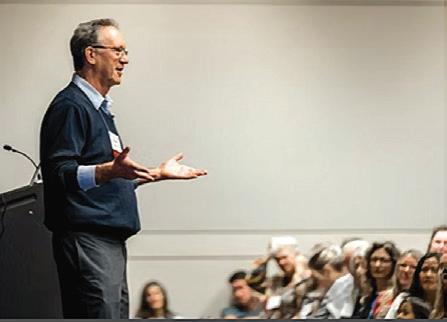
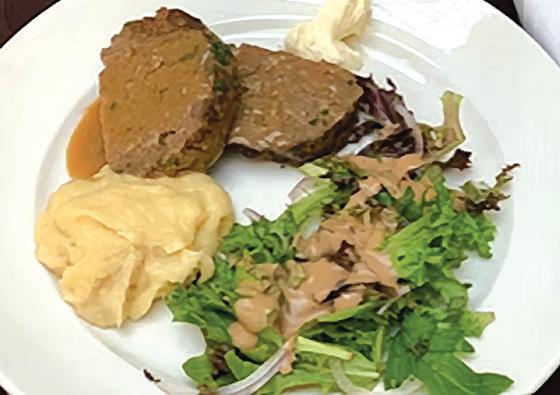


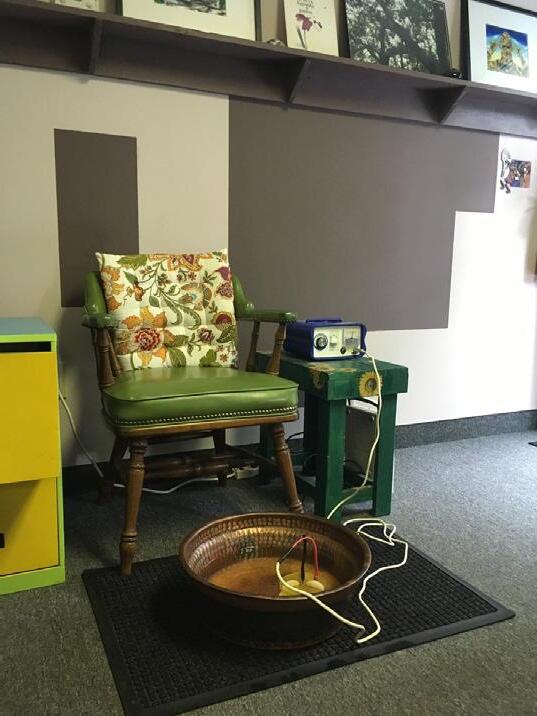

by Dr. Ruth Roberts, DVM, CVA, CVH, CVFT, NAN
Although spay and neuter surgeries in dogs are often encouraged to control overpopulation, avoid unwanted litters and prevent certain serious health conditions later in life, such as cancer, these surgeries—especially if performed at a very young age— may disrupt hormonal balance in some dogs. Known as spay-neuter syndrome (SNS), the condition can cause weight gain, anxiety and reduced vitality. For these dogs, several natural strategies can help restore hormonal balance.
Dogs’ ovaries and testes generate sex hormones such as estrogen, progesterone and testosterone, which regulate reproduction and play key roles in joint stability, metabolism, immune function, brain development and emotional regulation. When removed, the loss of hormonal feedback can disrupt many physiological systems.
A 2020 UC Davis-led analysis of 35 dog breeds found neutering before six months increased joint disorders and the risk of certain cancers, especially in larger dogs like Labradors and golden retrievers. Data from a 2013 study of more than 750 intact and neutered golden retrievers showed double the occurrence of hip dysplasia and triple the occurrence of ligament tears among early-neutered male dogs. Another study of golden retrievers in 2019 found that

neutered dogs had an increased risk of obesity. Research published in 2018 involving more than 6,000 male dogs found that those allowed to mature hormonally before sterilization exhibited fewer behavioral problems like fear and aggression, underscoring the importance of natural hormone exposure in development.
As more dogs experience the effects of SNS, natural hormone support is increasingly important. The building blocks for hormone production come primarily from nutrients found in whole, fresh foods. Without quality proteins, healthy fats and essential vitamins and minerals, the endocrine system struggles to produce, regulate and detoxify hormones.
Feeding dogs home-cooked meals using organic, GMO-free ingredients creates a solid nutritional foundation. High-quality animal proteins like grass-fed beef and pasture-raised poultry supply amino acids needed for hormone synthesis. Organic vegetables such as leafy greens, squash and carrots offer antioxidants and micronutrients. Healthy fats from fish oil, coconut oil and flaxseed provide cholesterol and essential fatty acids, the substances from which steroid hormones are made.
Supporting a dog’s detoxification systems is just as important. The liver and gut work together to process and eliminate excess
hormones and environmental toxins. Nutritional tools such as milk thistle, glutathione precursors and targeted probiotics may support these detox pathways, particularly in pets with hormonal imbalances. Additionally, natural binders like chlorella or bentonite clay are sometimes used to assist in removing certain heavy metals or persistent chemicals. However, these should be used only under professional guidance.
A 2020 review published in the journal Animals confirmed that neutering dogs leads to elevated luteinizing hormone levels, which in turn stress the thyroid, adrenal glands and immune system. This hormonal disruption can lead to chronic inflammation, behavior changes and metabolic dysfunction. Glandular supplements offer a holistic, non-pharmaceutical tool to nourish under-performing glands, especially when combined with a nutrient-rich diet and a toxin-conscious lifestyle. Bioavailable peptides, enzymes and growth factors help restore endocrine stability.
Natural herbal support may also play a role in maintaining hormonal balance. Adaptogenic herbs such as ashwagandha (Withania somnifera), rhodiola (Rhodiola rosea) and schisandra (Schisandra chinensis) have been studied in animals for their potential to modulate the stress response by regulating cortisol levels. Reproductive hormone balance may also benefit from red clover (Trifolium pratense) and chasteberry (Vitex agnus-castus). It is always important to consult with a veterinarian before introducing herbal supplements to a dog’s routine.
Lifestyle plays a significant role in hormone balance. Daily exercise, interactive play and consistent routines help regulate stress hormones like cortisol. Chronic stress can suppress immune function and disrupt the entire hormonal cascade.
Creating a toxin-conscious home is also important. Choose natural household cleaners, avoid synthetic air fresheners and opt for non-toxic pet care products. Providing filtered water reduces a dog’s exposure to hormone-disrupting contaminants often found in municipal supplies.
Ongoing monitoring with bloodwork, food sensitivity panels and thyroid testing helps pet parents track their dog’s progress and make informed adjustments. For dogs not yet sterilized, delaying the procedure until full maturity at 18 to 24 months or older may avoid many complications linked to early spaying and neutering.
Every dog is different. Breed, age, lifestyle and health status all play roles in determining the best course of action. Holistic veterinarians and certified pet health coaches can help design an individualized plan that supports a dog’s hormonal health naturally.
Learn more about Dr. Ruth Roberts’ approach to holistic pet care and wellness at DrRuthRoberts.com.

by Marlaina Donato
Life can be overwhelming at times. We diligently juggle work and personal commitments with outward precision while grappling with internal struggles, barely catching our breath, feeling off kilter and maybe a little ashamed that we can’t do it all. Somewhere along the line, we bought into the idea that worry puts us in the driver’s seat, granting us control over the road ahead.
We plan and strategize, convinced that holding the steering wheel in a white-knuckled grip will ensure the perfect outcome. We exhaust ourselves by running through an imagined maze and getting snagged on thorny what-ifs, too often investing precious energy into daydreaming about what could go wrong instead of wondering what could go right.
Professional dancers dedicated to their craft work six days a week and spend endless hours maintaining excellence. They attend classes even on performance days and undergo rigorous dress rehearsals before the curtain rises. Yet even these consummate professionals sometimes panic when the music begins, and they find themselves
unable to recall a single nuance of their choreography. In such instances, when the mind is in lockdown, their bodies take over, moving fluidly on cue.
This seemingly miraculous phenomenon known as muscle memory serves as an inspiration for our daily lives. After hard work and preparation, worry becomes an unnecessary mind game. The lecturer delivers their most compelling speech when they throw away their notes. The teacher connects to a challenging student when they think outside the box and embrace an unconventional approach. The soloist springs into the air as effortlessly as a bird.
As September takes the stage adorned in the sun’s spotlight, let us take our hands off the wheel and allow the road to unfold into unforeseen magic. By ceasing relentless planning and embracing spontaneity, we just might live our best life. Now is the time to dance.
Marlaina Donato is an author, visionary painter and composer. Connect at WildflowersAndWoodSmoke.com.


To place a calendar/ongoing/classified event, email content to MsTracy@MidlandsNA.com. Entries must adhere to our guidelines and be submitted by September 10 (for October issue). Call ahead before attending events to avoid any cancellations or changes.
MONDAY, SEPTEMBER 1 –
TUESDAY, SEPTEMBER 30
Wolky Shoe Sale–10am-5pm. $25 off Wolky brand. Foot Savi is your number one place for healthy feet. We are more than a shoe store; we are a medical boutique that meets all of your sole’s needs. 7001 St Andrews Rd, Columbia. Info: 803-781-1230.
SATURDAY, SEPTEMBER 6
Cold Weather Health Cider–10am-noon. The GROW Farm invites you to boost your immune system before the colder weather sets in. Pick your own fresh herbs to add to the cider. Cost: $20. 216 Singleton Dr, Columbia. Info/register: JoyfulSoulsNursery. com/event-details/make-your-own-autumnhealth-cider.
THURSDAY, SEPTEMBER 11
Virtual Contemplative Prayer Service–7pm. Celtic Wisdom Center invites you to join us for some virtual contemplative community time. This is a nontraditional guided service featuring prayer, poetry and reflection. Donations appreciated. Info/ register/Zoom link: Call Edwina at 303-8036289.
SATURDAY, SEPTEMBER 13
Fresh & Fun Fest–9am-noon. The GROW Farm invites you to their inaugural annual Fall Fair, a family-friendly event. Join them for a morning of fun, food and health. Vendors are welcome. Vendors must provide healthy, organic and natural products. Come promote your business, sell your products and demonstrate your services. 216 Singleton Dr, Columbia. Cost/info/register: JoyfulSoulsNursery.com/event-details/thegrow-farm-fresh-and-fun-fest-vendor-call.
WEDNESDAY, SEPTEMBER 17
Spiritual Book Group–3pm. Celtic Wisdom Center invites you for their in-person book group. The book for this month is Listening for the Heartbeat of God by J. Phillip Newell. This is a four-week group. Cost: $10 per week. Info/register: Call Edwina at 303-803-6289.
THURSDAY, SEPTEMBER 18
In-Person Celtic Service–7pm. Celtic Wisdom Center invites you to join their InPerson Celtic Service at Unitarian Universalist Church. Donations appreciated. 2701 Heywood St, Columbia. Info: Call Edwina at 303-803-6289.
WEDNESDAY, SEPTEMBER 24
Group Spiritual Direction–3pm and 7pm. Celtic Wisdom Center invites you to join their group spiritual direction class. In-person is at 3pm (location will be given upon registration); virtual is at 7pm. Cost: $15. Info/register: Call Edwina at 303-803-6289.
Sunday Jazz Brunch–Noon-3pm. Every Sunday. Chayz Lounge invites you to enjoy an elevated brunch experience. Reservations required; must be 21 and older. There is no cover charge. Chayz Lounge, 607 Meeting St, W Columbia. Info: 803-563-8375, ChayzLounge.com.
Arboretum Open House–1-4pm. Every third Sunday. Come and enjoy a nature walk through the W. Gordon Belser Arboretum, a wildlife preserve in the heart of Columbia. Pets are not permitted. Pathways are natural and pass through hilly terrain. Restroom facilities are not available. Free admission. W. Gordon Belser Arboretum, 4080 Bloomwood Rd, Columbia. Info: Arboretu@mailbox. sc.edu.
Virtual Healthy Living Support Group –7pm. Every third Sunday. Virtual support group via Zoom. Uplift, support and encourage one another while making necessary changes for better health and wellness. Info/ register: Contact Ms. Tracy at 839-228-1158 or OriginalOriginshw@gmail.com.
Grief Support Group –1-2pm. Every second and fourth Monday. Connect with others that have experienced loss and the challenges that living with grief brings. Free. Leeza’s Care Connection, 201 St Andrews Rd, Columbia. Info: 803-888-7525, LeezasCareConnection.org.
SUNDAY, SEPTEMBER 28
Encountering the Sacred in Nature–10am. Celtic Wisdom Center invites you for an easy wander (stroll and guided reflection) to share a communal encounter with the sacred in nature. Moore Park, 7507 Eastview Dr, Irmo. Cost: $15. Info/register: Call Edwina at 303803-6289.
MONDAY, SEPTEMBER 29
Virtual Garden Club–6:30pm. Joyful Souls Nursery invites you to join their Seed to Supper virtual garden club. Learn how to grow sustainably in your own space. Cost: $10. Info/register: JoyfulSoulsNursery.com.
Early-Stage Dementia Support Group–12pm. Every third Thursday. In-person and virtual. This group is for caregivers and families adjusting to a new diagnosis of some form of dementia. Free. Leeza’s Care Connection, 201 St Andrews Rd, Columbia. Info: 803-888-7525, LeezasCareConnection.org.
Art W/ Coping of Loss–6:30-8pm. Every fourth Thursday. Dr. Delores Gulledge teaches to use art as medicine when dealing with loss and grief. No experience required. Free. Leeza’s Care Connection, 201 St Andrews Rd, Columbia. Info: 803-888-7525, LeezasCareConnection.org.
Palmetto Trivia–7-9pm. Every Thursday. Teams compete for prizes awarded to the top three finishers. Trivia takes place outside in pleasant weather and moves indoors to the Bierkeller hall during inclement conditions. Free parking is available in the deck on Canalside Street. The Bierkeller, 600 Canalside St, Ste 1009, Columbia. Info/cost: BierkellerColumbia.com.
Thursday Night Jazz Party–8-11pm. Every Thursday. The Aristocrat hosts a Thursday Night Jazz Party featuring various artists and musicians. Guest musicians welcome to join in. Free admission. The Aristocrat, 1001 Washington St, Columbia. Info: ExperienceColumbiaSC.com/event/jazzparty-at-the-aristocrat/68104.
It’s a good idea to always do something relaxing prior to making an important decision in your life.
—Paulo Coelho
Tuesday
Survivors of Suicide Loss (SOS) –7-8:30pm. Every first Tuesday of the month. This is a peer-led group, not a place for someone that is in crisis of suicide. If you are in crisis, call or text 988 or text TALK to 741741. Westminster Presbyterian Church, 1715 Broad River Rd, Columbia. Info: 803-622-1512, SOSColumbiaSC@gmail.com.
B.I.O.M.G.–10-10:40am. Every Saturday. Join The Village parent support group virtually. This support group is for all parents. Being a parent can be challenging. You have a village to help you maneuver through tough times. Free. Info: Contact Rashika “Ro” Davis at 803550-9837 or BlackIceomg@gmail.com.
Connecting you to the leaders in natural health care and green living in our community. To find out how you can be included in the Community Resource Guide, call 839-228-1158 or email MsTracy@MidlandsNA.com.
DOWDY RUDOLPH CHIROPRACTIC
LLC
Dr. Dowdy Rudolph, DC 1444 Barnwell St, Columbia 803-376-6293 • DowdyRudolphChiro.com
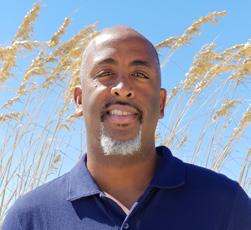
Dr. Gerald Rudolph, DC, focuses on finding the root cause of your problems and not just treating your pain. He utilizes digital X-rays to help diagnose problems, spinal adjustments to stimulate proper movement of spinal and extremity joints, active therapeutic movement exercises to correct movement disorders, and spinal decompression to help relieve numbness and tingling down your arms and legs. Dowdy Rudolph Chiropractic also offers a state-of-the-art full-body lounge hydromassage table that can help you feel more rejuvenated and relaxed. See ad, page 20.
SPRING RAIN HYDROTHERAPY
Linda Salyer
120 Kaminer Way Pkwy, Ste H, Columbia 803-361-2620 • LSalyer@ymail.com

All disease begins in the colon. Constipation; slow, sluggish bowel; gas and bloating? A colonic will help to rid you of these problems. Colonics promote good digestion, help speed metabolism, help lower cholesterol, and help relieve joint pain. Linda Salyer is IACN certified and a retired nurse. Saturday appointments available with an additional small convenience fee. See ad, page 23.
ABUNDANCE MANIFESTOR
Patricia Whyte
PatriciaWhyte.com

Do you often ask yourself, “Why am I not moving forward with all I am doing?” Does your life feel unmanageable or out of control? Is your physical space— and your mind—cluttered? Patricia is a global transformational leader and an expert in energy movement and manifesting. She is a certified Diamond Life Coach and Diamond certified in Feng Shui.
Feng Shui is the art of creating a harmonious and balanced environment by optimizing the flow of energy within a space. Many people feel stuck or overwhelmed in their careers, relationships or health. Clutter and disorganization are often part of the problem. Patricia offers a solution to help you move forward and live the life you deserve. Let her help you find your personal key to unlock your true potential and create a life filled with abundance, joy and boundless possibilities.
Juanita Ecker
518-941-9249
Juanita@TheShiftingSand.com
TheShiftingSand.com

Are you tired of turning to food to numb your feelings and finding comfort at the bottom of a snack bowl? Transform your relationship with food and stress. Stress eating isn’t about weakness—it’s about trapped emotions from past experiences that drive you to seek comfort in food. Juanita uses a gentle energy healing technique to identify and release emotional blocks, helping you break free from unhealthy patterns. Together, you’ll create lasting change—without shame or rigid rules. Life’s pressures don’t have to lead to the pantry. Your journey to overcoming stress eating starts here.
PEACEFUL PAUSE HEALING
Malai Roper
803-814-4001
Hello@PeacefulPauseHealing.com PeacefulPauseHealing.com

Malai is a holistic wellness practitioner specializing in Reiki, Ayurvedic wellness and Eastern massage. She creates personalized healing experiences that support women in reconnecting with their bodies, restoring balance and nurturing their inner peace. Her approach blends ancient wisdom with modern practices. She offers a safe, sacred space for women to pause, release and realign. Are you ready to prioritize yourself? Book your healing consultation today and take the first step toward your personalized wellness journey. In-person and virtual sessions are available. See ad, page 23.
PRIMERICA FINANCIAL ADVISOR
Hannah Tucker 803-427-8742
HannahTucker@Primerica.com
TherealHowMoneyWorks.com/us/ teamtucker
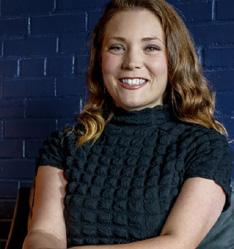
True wellness is not just physical—it includes financial peace of mind. Hannah Tucker helps individuals and families create stress-free financial plans that promote security, stability and long-term wealth. Through free consultations and financial plans, Hannah provides guidance on eliminating debt, protecting your income, growing your assets, and planning for a secure retirement—without financial strain. A solid financial foundation leads to a healthier, more balanced life. Let us create a plan that supports your overall well-being. Call Hannah to book your free consultation and unlock your path to wealth, peace and financial independence.
FOOT SAVI
7001 St Andrews Rd, Ste A Certified Board Pedorthist and Brace Specialist 803-781-1230 • FootSavi.com

With more than 30-plus years in the footcare/footwear industry, Sion Owen helps with a variety of issues, including gait analysis, foot assessments, custom orthotics, bracing and compression therapy, plantar fascia pain, neuropathy and fitting for therapeutic shoes for patients with diabetes, arthritis, painful bunions, callouses and hammer toes. Call to schedule an appointment! See ad, page 20.
Michael Woodland 1421 Calhoun St, Columbia 803-237-2536 • Michael@ESNTLHeadshots.com ESNTLHeadshots.com

Make a powerful first impression with ESNTL Headshots. ESNTL Headshots, the Midlands’ leader in professional photography, captures images that define your success. We specialize in corporate headshots and branding photography. Our corporate headshots provide polished, professional images for executives, teams and company profiles. Our branding photography provides dynamic shots for entrepreneurs, showcasing your personality and elevating your brand. We have options to bring the studio to you, delivering high-quality images that leave a lasting impact. Book today to level up your success.
ABOUT YOUR HEALTH INC
120 Kaminer Way Pkwy, Ste J, Columbia 803-798-8687 • AboutYourHealthSC.com

About Your Health Inc’s main focus is health education and health-enhancing services, including One-on-One Nutritional Counseling, Live/Dry Blood Cell Observation, Mild Hyperbaric Chamber, Ozone Therapies, Thermography, Aqua-chi Footbath, Far Infrared Sauna and more. They also carry hardto-find natural, organic, whole-food nutritional supplements and products. See ad, page 27.
Tracy R. Jacox • 833-678-7229
OriginalOriginshw@gmail.com
OriginalOriginshw.com

Ms. Tracy has over 30 years of experience in the medical field. Original Origins can assist you with maximizing your health and wellness holistically! Our wide range of services include health coach partnering, comprehensive health evaluations, comprehensive cooking experiences, and a comprehensive kitchen evaluation. Your health is your wealth! See ad, page 3.
Donna Mack
803-766-4913
PositiveProjectionsllc@gmail.com
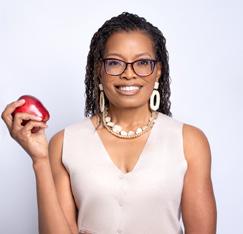
PositiveProjectionsllc.com
Donna Mack and her team bring over 30 years of combined experience in offering health and wellness classes. Our courses are designed to empower participants to live their healthiest and happiest lives as they age. We’ve seen firsthand how gaining greater understanding of health impacts and making simple changes in lifestyles can lead to real healing. We offer a signature Healthy Body Health class to provide you with an “owner’s manual” for your body, offering practical tools and a personalized plan to help you take charge of maintaining your health for a lifetime. Call to make an appointment today.
SPHINX PAW
3400 Two Notch Rd, Columbia 803-754-3922
SphinxPaw.com

Discover a haven for holistic well-being at Sphinx Paw. Sphinx Paw has been at the forefront of healing in the Columbia area since 2007. We offer a diverse selection of herbs, books, candles and incense to support natural detoxification, personal healing and spiritual growth. Embrace your wellness journey with our
thoughtfully chosen products and expert guidance. Our distinctive resources promote holistic self-care, natural detoxification, weight loss, personal healing, and spiritual growth throughout all phases of life. Sphinx Paw has everything you need to support you in a life of health excellence and well-being.
Dr. Rachel Hall
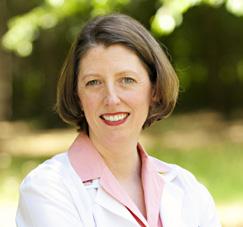
130 Suber Rd, Columbia 803-796-1702 • DrRachelHall.com reception@drrachelhall.com Find us on Facebook for great health tips. Integrative/Holistic medicine consults for anyone wanting to approach their health more naturally. Dr. Rachel Hall is board certified in both family medicine and integrative holistic medicine. Together we will focus on finding the root of the problem, not just treating symptoms. Call today for a consult if you are looking to achieve balance. In-house diagnostic labs and therapies. See ad, page 19.
JOY LEE CONNOR
Healing Minster at Springhill AtONEment Center 803-447-6499
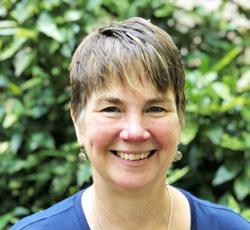
Joy has more than 30 years of experience in energy and bodywork. She teaches Reiki, Touch for Health, Meditation, Yoga, Ayurveda and A Course in Miracles. Joy welcomes and sees clients who are ready to shed guilt and limitations in favor of forgiveness and freedom. One hundred acres of trees surround this pristine location for healing at Springhill AtONEment Center. Nature walks and fireside gatherings available. Contact Joy at 803-447-6499.
JAN SHAW PERSONAL TRAINING & MASSAGE (MAS1935) 806 12th St, West Columbia 803-360-7895 • JanShawHealth.com

Jan Shaw has many years of experience in exercise physiology and massage. She specializes in the John F. Barnes method of Myofascial Release Therapy; holds an M.S. in Exercise Science; has worked in rehab medicine for 10 years re-training patients with a myriad of physical injuries; and is skilled in MFR 1, 2, Unwinding, SES and Cervicothoracic. Whatever your needs, Shaw has the education and experience to help you.
GARNER’S NATURAL LIFE
4840 Forest Dr, Ste 15-A, Columbia 803-454-7700
5166 Sunset Blvd, Ste C, Lexington 803-973-3001
GarnersNaturalLife.com
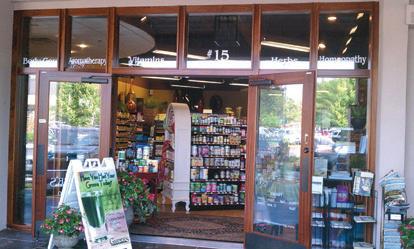
Garners Natural Life is a locally and family-owned natural health store that has been a staple in the community for decades. Improve your health with the purest, most innovative high-quality natural products, including vitamins, herbal supplements and aromatherapy. Their newest product, GLP-1 Pro, is a probiotic blend that supports healthy weight management and helps curb food cravings. They also offer a full line of chemical-free shampoos, conditioners and natural soaps. Take your health somewhere it’s never been—visit one of their local locations today. See ad, back page.
PROSPER AND THRIVE PELVIC HEALTH AND WELLNESS
Dr. Kelsey Stegall 120 Sparkleberry Crossing Rd, Columbia 803-250-1836
Kelsey@ProsperAndThrive.co ProsperAndThrive.co
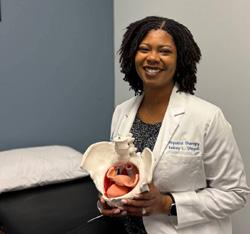
Dr. Kelsey Stegall is a Board-Certified Clinical Specialist in Women’s Health Physical Therapy. Pelvic floor therapy strengthens muscles supporting the bladder, bowels and reproductive organs in men and women. Dr. Kelsey assists men and women in improving bladder and bowel control, as well as enhancing sexual function. Her therapy techniques help women improve recovery after childbirth and gynecological procedures, and she also assists men in improving recovery after prostate surgery and men with pelvic pain and dysfunction. You deserve a life that is leakage- and pain-free during exercise and intimacy. Book a consultation with Dr. Kelsey to discuss how you can experience a patient-centered, full-body approach to true wellness and reclaim your life.
LUVEVA AESTHETICS SPA
Eva Rigney, RN Certified Esthetician 630-17 Promenade Pl, Ste 401, Columbia LuvevaSpa.GlossGenius.com

Eva Rigney is an Aesthetic Nurse and an Army Veteran. She has been in the medical field for more than 20 years and focuses on her lifelong passion of skin care. She in-
corporates updated and newest innovations in esthetics, such as permanent makeup (PMU), including 3D areola, Botox and more. She enjoys providing facial and body treatments, along with advanced techniques. She shares her knowledge on skin care, and assists with recommendations of the Luveva skin care line. “My goal is to help everyone achieve revitalized healthy skin,” she says. See ad, page 5.
CELTIC WISDOM CENTER
Edwina@CelticWisdomCenter.com CelticWisdomCenter.com

The Celtic Wisdom Center is an eco-spiritual nonprofit community that embraces Celtic worship, contemplative practices, and spiritual direction. Through unique offerings like wander walks and contemplative nature experiences, we invite individuals to connect with the divine through nature and engage in Earth-centered practices that foster spiritual community. At the Celtic Wisdom Center, the timeless wisdom of the Celtic spiritual heritage helps transform the ordinary into the sacred. This is a holy and safe space to explore your spiritual path, deepen your connection with the divine, care for the Earth, and find a supportive community dedicated to holistic living. All are welcome.
SEW AND HEAL
Jacquelyn Odom
7825 Broad River Rd, Ste 200, Irmo 828-590-1228
SewAndHeal@gmail.com
SewAndHeal.My.Canva.Site

Sew and Heal is a nonprofit organization founded by Jaqueline, inspired by her journey of using sewing as an outlet to overcome the challenges of PTSD, anxiety and depression stemming from her military trauma. The organization empowers women and children to find healing and creativity through the art of sewing, turning pain into purpose. Sew and Heal provides a safe and supportive space for healing through sewing. Their mission is to foster emotional well-being, creativity and connection.
Private & Corporate Yoga Teacher Hello@CateKeys.com CateKeys.com

Cate is a certified yoga teacher who offers private and corporate yoga sessions both virtually and in person. After experiencing the profound impact of yoga during the postpartum period, Cate felt called to share its deeper, more transformative aspects with others. What began as a physical practice evolved into a holistic journey that helped her reconnect with her body, find mental clarity, and embrace a more authentic life. Today, she brings that same intentional approach to her work to create personalized experiences that meet each client where they are. Cate’s offerings are rooted in compassion and clarity, supporting individuals and teams alike in finding balance, focus and well-being. Ready to explore how yoga and energy healing can support you or your team? Book a free consultation with Cate today to get started.
All classes are free and taught by certified instructors. Classes will not be held during inclement weather. Participants should bring a yoga mat, towel and water.
WEDNESDAYS
SEPTEMBER 3, 10, 17, 24
Yoga at the Park–9am. Elmwood Roy Lynch Park, 900 Abbeville St, Columbia. Info:803-545-3100.
Yoga at Rosewood–6pm. Rosewood Market, 2803 Rosewood Dr, Columbia. Info: 803-765-1083.
SUNDAYS SEPTEMBER 7, 14, 21, 28
Yoga at Rosewood–2pm. Rosewood Market, 2803 Rosewood Dr, Columbia. Info: 803-765-1083.
In youth, we learn; in age, we understand.
—Marie von Ebner-Eschenbach
Make sure to let our advertisers know you found them in

